

How to Write a Compelling Pharmacy School Personal Statement
Written by Kelly Jeroski
July 12, 2022

If you’re applying to any higher education program, you’re most likely going to run into something called a “personal statement”. Pharmacy school is no exception, and learning how to write a compelling and unique personal statement is a key part in getting accepted to school. Read on to find out how to write one that stands out!
What is a Personal Statement?
A personal statement serves as a way to highlight your skills, interests and experiences. Personal statements tend to be somewhat autobiographical, but it is not just a lengthy personal essay of your entire life story.
Personal statements are also not a regurgitation of all the information you’ve already included in your application and cover letter. Think of your personal statement as more of a narrative, but still keep it informative.
In writing a personal statement, you’re aiming to give the school or program you’re applying for a snapshot of who you are and why you want to be considered for whatever position. They are as much about how you write as what you write. Schools will receive hundreds of personal statements– make sure yours stands out!
What is the Difference Between a Personal Statement and a Cover Letter?
A cover letter generally serves as a means to sell yourself to a company or school. It introduces your resume and all your relevant school and employment history. A personal statement, however, is meant to be more creative and introduce the school to you as a person in an engaging format.
While an application can come off as just a list of what you’ve done, a personal statement frames all your accomplishments in a way that connects your real-life influences with the dates and degrees on your application.
What is the Best Format for a Personal Statement for Pharmacy School?
Think of your personal statement as a narrative essay outlining how you got to where you are today, as well as where you want to go next. Within this story, relate back to pharmaceuticals and medicine and healthcare fields in an organic way. You’ve chosen this path for a reason, what are the steps that got you here?
What Questions Should I Answer in my Personal Statement?
Some helpful questions to aim to answer throughout your personal statement are:
✅ Why do I want to be a Pharmacist?: Think through the times where you have admired pharmaceuticals or where they have most impacted you. Or, think about when you fell in love with medicine and helped people through pharmaceuticals.
✅ What different pharmaceutical paths would I be interested in pursuing?: Are you interested in nuclear pharmacy? What about private pharmaceutical production? If you have a specific niche in mind for a career path, use this space to talk about your interest.
✅ What makes me an excellent and unique candidate for this program?: Have you taken any specialized courses that make you uniquely qualified for this program? Have you had any outstanding internships or positions within the healthcare world?
✅ What are my strengths?: Where do you excel? What specific strengths could you bring to the program and the team you work with? Use this space to highlight your gifts.
✅ Are there any gaps or inadequacies in my application? How can I explain them here?: If you have anything on your application that may confuse someone not familiar with your life circumstances, try to concisely explain it here. Admissions counselors want to be able to give you the best shot possible at being accepted, and sometimes this requires you being up-front about gaps or missing pieces to your work history.
What Should I Avoid in My Personal Statement?
❌ Don’t just repeat what you’ve said in your application. There’s a place for a more sterile, list-based amalgamation of your achievements, but your personal statement is not this place. Admissions staff will learn a lot more about you if you’re creative with your personal statement.
❌ Don’t steal someone else’s work. Plagiarism will disqualify you from admission to pharmacy programs, and it’s also just bad practice for life in general.
❌ Avoid cliches throughout your writing. It may have been a dark and stormy night when you were born, but that is neither relevant nor original. Find fresh ways to tell your story and engage your readers.
❌ Avoid grammar and spelling mistakes. These can be avoided through several rounds of revision
What Are Admissions Counselors Looking for in a Personal Statement?
What makes a good candidate may vary from program to program, but there are some general things that admissions counselors look for when reviewing personal statements from applicants:
- How have you grown over the years?
- Is your personal statement well-written? Does it show care, consideration and edits?
- Are you up for the challenge of Pharmacy school?
- Do you fit our program?
What Are the Steps to Form a Compelling Personal Statement?
The creative process for a piece like this may vary form applicant to applicant, but the general steps are as follows
1. Brainstorm
This step can be messy, and is generally the most customizable of the process. To start your brainstorming process, think about all the reasons you’re considering pharmacy school and why this program should consider you. This is also a good place to start thinking about what makes you stand out from other candidates, as well as beginning to organize your education and work history.
Since personal statements are more narrative than list-based, start to think about how pharmacists have influenced your life and family. Compelling stories from your own experiences will help admissions counselors see you have a full-bodied connection to the program and career field.
As part of your brainstorming, look at successful personal statements. Websites like Studential and ApplyToUni can give you a good idea of what spelled success for past applicants. Or, if you know anyone who went to pharmacy school already, you can ask them for their best tips.
2. Outline and Draft
How do you make sense of all the information you just brainstormed out? One of the best ways to sort through your thoughts is by looking for natural connections between events in your life. Be sure to highlight the aspects of your career and schooling that will make you stand out the most.
Make sure you’re outlining your statement in a way that makes the most sense for both your story and your reader. Linear outlines with clear progressions through your life story usually work best, but that’s not to say you can’t jump around in the story a bit, especially if pharmacology has played a lot of different roles throughout your life and you’re looking to highlight its effect on you over time.
There are different types of personal statements, generally prompted or unprompted, but they all tend to be between 400-1,000 words long.
Check your personal statement for basic grammatical and spelling mistakes, as well as making sure your tone is both professional and friendly. Make sure your organization makes sense. A good way to ensure this is to have someone else read it and suggest edits. The more sets of eyes you can have on your personal statement, the better chance you’ll have of submitting a flawless piece.
Running your personal statement through a program like Grammarly or Hemingway is another good way to weed out mistakes and make sure your statement is clear.
4. Final Revisions and Submission
Do some final checks of your personal statement. Try to read it as if you’re reading it for the first time, with no context as to your own story. An early start in the writing and drafting process is key for this step, so you can take a few days away from your statement before this final revision if necessary.
If your personal statement was one with a prompt, use this check to be sure you have answered all the questions as fully and uniquely as possible. This is another great place to ask for a second set of eyes to review your statement.
Finally, submit your personal statement with your application to pharmacy school. Be sure that you’ve submitted it before the deadline!
How Do I Close a Personal Statement?
In closing your personal statement, include one last push for yourself and why you’re a good fit for the program. Try to naturally conclude and wrap up all that you’ve said about yourself and your story. Be sure to highlight your interest in the program specifically and give a quick “thank you” for their consideration of your application.
What Now?
Now that you know how to write a great personal statement for pharmacy school, you should narrow down the schools you want to apply to. If you haven’t already, consider NEOMED’s College of Pharmacy ! Our program will prepare you to make an impact on those around you for the better, whether locally or globally. Graduates from our programs boast high NAPLEX test scores, excellent network connections and a deeper understanding of the communities they serve. Apply to NEOMED !
Want to learn more about pharmacy school at NEOMED? Our pharmacy program guide will help you determine if pharmacy school is the right path for you, and how NEOMED can help you begin your future.
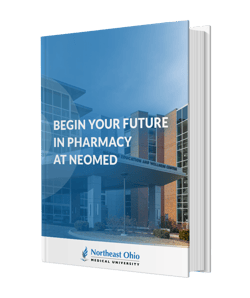
Access our eBook "Begin Your Future in Pharmacy at NEOMED" to learn more about what it takes to become a pharmacist.

About the author
Kelly jeroski.
Assistant Director of Admission
More Articles
What do you learn in pharmacy school here are 6 surprising things, how hard is it to get into pharmacy school 3 key application tips, 4 tips for your pharmacy school interview.
- AI Content Shield
- AI KW Research
- AI Assistant
- SEO Optimizer
- AI KW Clustering
- Customer reviews
- The NLO Revolution
- Press Center
- Help Center
- Content Resources
- Facebook Group
A Quick Guide to Writing Pharmacy School Personal Statement
Table of Contents
When it comes to applying to pharmacy school, your personal statement is one of the most important pieces of your application. It’s your opportunity to stand out from the rest of the applicant pool. So how do you write a personal statement that will make an impression? This article provides valuable tips and a pharmacy school personal statement sample to study and use as inspiration while writing one for yourself.
So read on for everything you need to know about writing a successful pharmacy school personal statement!
What Is a Pharmacy School Personal Statement?
Pharmacy school personal statements are documents that allow pharmacy students to introduce themselves and their reasons for wanting to attend pharmacy school. They can also highlight any unique experiences or qualifications the student has that would make them a good candidate for admission into pharmacy school.
Personal statements are important because they help admission committees get to know potential students beyond just their grades and test scores. Your statement should be well-written, honest, and reflective of who you are as a person.
What Do Colleges Look for in Pharmacy Students?
The skills and qualities that colleges look for in pharmacy students typically include the following:
Strong Analytical and Problem-Solving Skills
Pharmacy is a science-based profession, so the ability to think critically and solve complex problems is essential.
Solid Math Skills
A foundational knowledge of math is necessary for understanding the concepts behind pharmaceutical calculations.
Excellent Communication Skills
The pharmacist’s role involves communicating with patients, other healthcare professionals, and pharmacists at different pharmacies. Good communication abilities are essential for success in this field.
Passion for Helping Others Improve Their Health
Pharmacists play a significant part in improving patient care. So it’s important that potential students have a sincere desire to help others achieve better health outcomes.
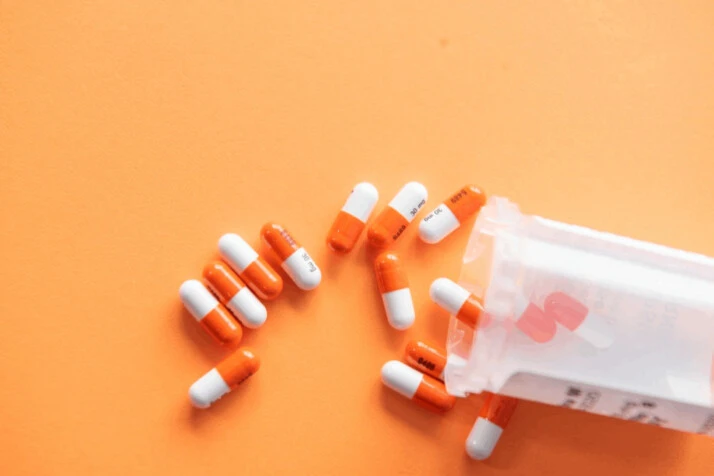
Tips to Write a Pharmacy School Personal Statement
Here are some practical tips to keep in mind when writing your pharmacy school personal statement :
- Start early: Give yourself plenty of time to write a strong personal statement. This isn’t something that can be rushed, so start thinking about it well before the application deadline.
- Be specific: Don’t just say that you want to become a pharmacist because you like helping people. Give concrete examples of how you’ve helped others in the past and what motivated you to pursue this career path.
- Sell yourself: Emphasize your strengths and why you believe pharmacy is the right fit for you. Think about what sets you apart from other candidates.
- Show, don’t tell: Rather than simply stating your goals or qualifications, use anecdotes or stories to illustrate them. This will make your essay more engaging and unique.
Pharmacy School Personal Statement Sample
Use the following pharmacy school personal statement sample as inspiration to craft your own:
Ever since I was a little girl, I loved going to the pharmacy with my mom. Watching her talk to the pharmacist always fascinated me and sparked my interest in pursuing a career in pharmacy. As I grew older, I began to realize that pharmacies are more than just places where you can buy medication. They play a crucial role in our healthcare system by ensuring that medications are dispensed correctly and safely. This is why I am so passionate about becoming a pharmacist myself. I want to help contribute to making sure that people have access to quality medications when they need them most.
While attending college, I had the opportunity to work as an intern at several different pharmacies. This gave me invaluable experience working directly with patients and pharmacists alike. Through these experiences, I developed a strong love for chemistry and pharmacology. This has only solidified my desire to pursue a degree in Pharmacy once I complete my undergraduate studies.
Ultimately, my goal is to become licensed as PharmD and work within a community or hospital setting. I want to dispense medication prescribed by physicians optimally and safely to facilitate patients’ healing process. Providing high-quality care combined with warmth, compassion, and individualized service excellence will make a difference in the lives of those we encounter every day.
The purpose of a personal statement is to give the admissions committee a preview of what you have to offer as a prospective student . It allows a recruiter to form a personal opinion of you.
This article provides valuable tips with a strong sample to help you craft a pharmacy personal statement and present yourself as a qualified applicant.

Abir Ghenaiet
Abir is a data analyst and researcher. Among her interests are artificial intelligence, machine learning, and natural language processing. As a humanitarian and educator, she actively supports women in tech and promotes diversity.
Explore All Write Personal Statement Articles
How to draft meaningful length of law school personal statement.
Are you confused on how to write a law school personal statement? One of the essential elements of your application…
- Write Personal Statement
Effective History and International Relations Personal Statement to Try
Are you considering studying history and international relations? Or you may be curious about what a degree in this field…
Guide to Quality Global Management Personal Statement
Are you applying for a global management program and want to stand out from the crowd? A well-written personal statement…
How to Draft Better Examples of Personal Statements for Residency
Achieving a residency can be a massive accomplishment for any aspiring medical professional. To secure your spot in one of…
Tips for Drafting a Free Example of Personal History Statement
A personal history statement can be crucial to many applications, from university admissions to job search processes. This blog will…
Writing Compelling Dietetic Internship Personal Statement
Applying for a dietetic internship is a rigorous process and requires submitting a personal statement, which is an essential part…
Writing the Personal Statement for Pharmacy School: A Checklist
You’ve likely written a personal statement at some point in your life. Perhaps while applying to your undergraduate program, some of your schools required you to include an essay describing your achievements, yourself, and what you hope to accomplish in your time at their university. Similarly, many pharmacy programs will require you to write a personal statement for their application.
This, however, is different. You will be able to highlight your relevant accomplishments and address why you want to become a pharmacist to stand out truly . With so many applicants during each cycle, admissions officers use this personal statement to gauge whom they wish to speak with for an in-person interview.
At this phase of the application journey, you've narrowed down the pharmacy schools you’re applying to. Your transcripts are in, letters of recommendation are ready, and it’s time for your pharmacy personal statement. The good news is that, unlike undergraduate applications that sometimes have different prompts, you must answer for various schools; your one pharmacy school personal statement will be sent to every program through your PharmCAS application . That also leaves an exciting challenge: Even if you have a favorite, you must consider how you want to write this personal statement, as it shouldn’t be tailored toward one specific school.
Determining the Narrative
When it comes to writing a pharmacy school personal statement, the most common pitfall students experience is the need for more effort placed into their writing. While your grades may be exceptional, and your letters of recommendation prove that your student-teacher relationships are healthy and you are a pleasure to have in class, having a generic pharmacy personal statement doesn’t differentiate you from other qualified applicants. If all applicants have already covered the first two things, the personal statement may be the shining piece of the application. For most students, writing this statement will be the most challenging part of the application process.
Begin to formulate your narrative. Lay out the structure and the different sections. There’s no specific format that pharmacy schools are looking for, so make this personal statement unique to yourself. As mentioned, the “cookie cutter” approach to this part of the application is where most students stumble. Use your time wisely and start early . Additionally, you can easily find a sample personal statement on various websites to help structure your thoughts. However, remember that these should be used only as samples and that you shouldn’t rely on them to format your own statement.
Crafting a Unique Story
Each pharmacy school program wants students who demonstrate tenacity, which will help them succeed in their respective programs. One way to approach writing your pharmacy school personal statement is from the point of view of the admissions committee. Anyone charged with reading thousands of applications will focus on specific questions that signal a level of quality about the rest of the personal statement.
First, what's the reason that this student is choosing pharmacy as their career? Are they doing this for income or genuine interest in providing the best care for patients? Does the applicant demonstrate thoughtful understanding of their strengths and weaknesses? Do their ideals align with the mission statement of the school of pharmacy? Each reviewer may concentrate on different questions, but they want to see you feel a personal drive for a career as a pharmacist. Place yourself into the seat of an application reviewer and formulate different questions that you could potentially ask students. Try answering these questions and see how genuine your answers are. How you answer may decide if you want to continue to pursue this pharmacy school path.
Focus on Your Opening
One universal method many writing courses teach you is always to have a solid opening statement. Use this as an opportunity to begin with a personal story about why you decided that pharmacy is the right career for you or maybe an inspiring quote that has always resonated with you. The reviewer may have already gone through several applications, so your first few sentences should stand out. You want to be able to make an impression from the beginning while showing an earnest drive to spend a career as a pharmacist.
Once you’ve effectively engaged the reviewer, it’s time for the “meat” of the personal statement. What do pharmacy application committees truly want to hear?
Getting to Know You
They want to learn more about you before meeting in a live interview. Tell your own story succinctly but without cutting corners. Briefly describe how you learned to overcome obstacles like that to better yourself and those around you. Sure, you can write about your most relevant academic accomplishments. But go beyond that.
Discuss how certain clubs and organizations have helped you progress through your undergraduate experience and how those organizations may have led you to pursue the path of pharmacy school. Highlight the different leadership positions you may have held in college that have helped mold you into the leader you see yourself as today. After setting those up, discuss the skills you’ve acquired to help you in pharmacy school and how they’d make you a better pharmacist.
When you mention your relevant academic studies, please don't forget to keep repeating the pharmacy college admission test (PCAT) scores or the 4.0 GPA that you achieved. The committee has this information before them as they read; they don’t need to be reminded.
Talk in detail about your relevant work experiences, such as research or a part-time job in a pharmacy. Discuss how these different work experiences furthered your commitment to the profession. Identify what aspects of the pharmacy setting may have attracted you and what you ultimately have learned from these experiences. Some students come into this part of the application process without work experience. That’s okay. You can highlight any volunteer work related to healthcare or pharmacy.
Close with Confidence
Finally—and we can’t stress this enough—keep your writing professional. You’re making an impression on a professional committee, and as much as you want to make your statement sound lighthearted, keep in mind that the reviewers’ time is at a premium for reviewing the essays and interviews in the next round.
Be succinct, direct, and human.
Remember to keep our advice top of mind:
The goal of your personal statement is to showcase why you would be the ideal pharmacy student and why your traits/qualities reflect those of a pharmacist.
Be as authentic as possible when detailing why you want to be part of the PharmD program.
GPA and PCAT scores can only get you so far. Your personal statement is a chance for you to stand out in front of the other applicants who apply to the same pharmacy program as you.
Remember, perfecting the personal statement takes time and your admission may depend on how much effort you ultimately put into your writing.
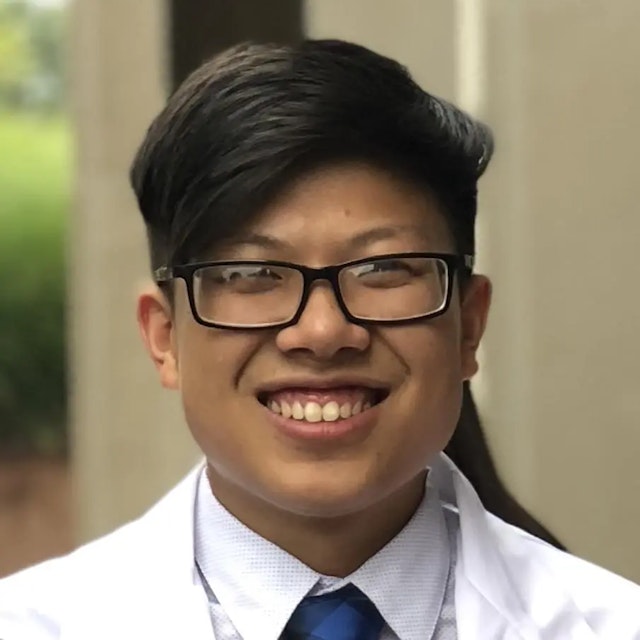
Hong Chen, PharmD
My name is Hong Kui Chen and I am a graduate of The Ohio State University Pharmacy Class of 2022. I am currently working as a clinical research associate at Medpace, Inc, a contract research organization based in Cincinnati, Ohio. My work mainly consists of traveling to various sites around the country and providing protocol training on new clinical trials or monitoring data. While I enjoyed the traditional pharmacy role of working in retail or hospital, I wanted to expand and pursue this non-traditional role to see how clinical trials operate. I have a passion for being able to impact patients in a grand scale and even though I don’t have the 1-on-1 patient interaction, the work that I do can have long lasting contributions to overall patient health.
Opinions and information published by the author here on PharmDDegree.com are of my own and do not necessarily represent the views or opinions of my employer.
Do Not Sell My Info

Pharmacy Personal Statement Examples
- 1 Pharmacy Personal Statement Example Links
- 2 Career Opportunities
- 3 UK Admission Requirements
- 4 UK Earnings Potential For Pharmacists
- 5 Similar Courses in UK
- 6 UK Curriculum
- 7 Alumni Network
Pharmacy Personal Statement Example Links
- Personal Statement Example 1
- Personal Statement Example 2
- Personal Statement Example 3
- Personal Statement Example 4
- Personal Statement Example 5
Hello, future health professionals! Ever contemplated how medicines affect the human body? Interested in the science behind drug discovery, development, and therapeutic use?
If so, a degree in Pharmacy may be your calling. This dynamic field will provide you with the knowledge and skills to make a real difference to patient care, understanding and influencing the use of medications in society. Ready to become an indispensable part of the healthcare system? Join us on this rewarding journey into the world of Pharmacy.
Pharmacy is an interesting and relevant choice for students because it is a growing field that offers a variety of career opportunities. Pharmacy is a healthcare profession that involves the preparation, dispensing, and monitoring of medication and other health-related products.
Pharmacists are responsible for ensuring the safe and effective use of medications, as well as providing patient education and counseling. This university course is designed to provide students with the knowledge and skills necessary to become a successful pharmacist. It covers topics such as pharmacology, pharmaceutical calculations, drug interactions, compounding, dispensing, and patient counseling.
In addition, students will learn about the legal and ethical responsibilities of a pharmacist, as well as the business aspects of the profession. With the increasing demand for pharmacists, a degree in pharmacy can open up many career opportunities in a variety of settings, including hospitals, retail pharmacies, and pharmaceutical companies.
👍 When writing a personal statement : Highlight your passion for the course, demonstrating your understanding of it. Use relevant personal experiences, coursework, or work history to showcase how these have fostered your interest and readiness for the course.
Career Opportunities
A person with a degree in pharmacy can pursue a variety of careers and professions, including:
1. Clinical Pharmacist: Clinical pharmacists work in hospitals, clinics, and other healthcare settings to dispense medications, monitor patient drug therapies, and provide patient education.
2. Community Pharmacist: Community pharmacists work in retail pharmacies, providing medication and health advice to customers.
3. Pharmaceutical Sales Representative: Pharmaceutical sales representatives work for pharmaceutical companies, promoting and selling their products to healthcare professionals.
4. Pharmaceutical Scientist: Pharmaceutical scientists conduct research and develop new drugs and treatments.
5. Regulatory Affairs Manager: Regulatory affairs managers work for pharmaceutical companies, ensuring that their products comply with all relevant regulations.
6. Pharmacy Technician: Pharmacy technicians assist pharmacists in preparing and dispensing medications.
7. Compounding Pharmacist: Compounding pharmacists specialize in preparing customized medications for individual patients.
8. Pharmacy Informatics Specialist: Pharmacy informatics specialists use technology to manage patient information and medication data.
9. Academic Pharmacist: Academic pharmacists teach and conduct research in universities and colleges.
10. Pharmaceutical Consultant: Pharmaceutical consultants provide advice and guidance to pharmaceutical companies on a variety of topics.
UK Admission Requirements
In order to be accepted into a pharmacy course at a UK university, applicants must have achieved a minimum of three A-Levels, with at least two of them being in science-related subjects. The third A-Level can be in any subject, although some universities may prefer it to be in a science-related subject. Additionally, some universities may require applicants to have achieved a minimum grade in their A-Levels, such as a C or higher.
In terms of prerequisites, applicants must have a good understanding of mathematics and science, including chemistry, biology and physics. They must also have a good understanding of the English language, both written and spoken.
The entry criteria for a pharmacy course is generally similar to other courses in the sciences and healthcare fields. However, some universities may require applicants to have achieved higher grades in their A-Levels or may require applicants to have achieved a minimum grade in their A-Levels, such as a C or higher. Additionally, some universities may require applicants to have achieved a minimum grade in their GCSEs , such as a B or higher.
UK Earnings Potential For Pharmacists
The average earnings for someone with a degree in pharmacy vary depending on the job role and the country in which they are employed. In the UK, pharmacists typically earn an average salary of £40,000 – £50,000 per year. The salary range can vary depending on factors such as experience, qualifications, and location.
Recent trends in the job market suggest that the demand for pharmacists is increasing. This is due to the growing demand for prescription medications, as well as the increasing complexity of the healthcare system. As a result, pharmacists are in high demand and salaries are expected to increase in the future.
Similar Courses in UK
Other university courses related to pharmacy include pharmaceutical science, medicinal chemistry, and pharmacology.
Pharmaceutical science focuses on the development and production of drugs, while medicinal chemistry focuses on the design and synthesis of drugs.
Pharmacology is the study of how drugs interact with the body and how they are used to treat diseases. The key differences between these courses is that pharmacy focuses on the application of drugs in the clinical setting, while the other courses focus on the development and production of drugs.
UK Curriculum
The key topics and modules covered in the pharmacy course at a UK university typically include pharmaceutical sciences, pharmacology, pharmacotherapeutics, pharmacy practice, and pharmaceutics.
Pharmaceutical sciences modules typically include topics such as drug discovery and development, drug design, pharmacokinetics, and drug delivery systems.
Pharmacology modules typically include topics such as drug-receptor interactions, drug metabolism, and pharmacodynamics.
Pharmacotherapeutics modules typically include topics such as the principles of therapeutics, drug interactions, and the management of common diseases.
Pharmacy practice modules typically include topics such as the legal and ethical aspects of pharmacy practice, patient counselling, and communication skills.
Pharmaceutics modules typically include topics such as dosage forms, drug stability, and the manufacture of pharmaceuticals.
In addition to the theoretical aspects of the course, there is usually a significant amount of practical work and hands-on experience involved. This may include laboratory work, clinical placements, and the preparation and dispensing of medicines.
Alumni Network
Notable alumni from the course include Nobel Prize winner Sir Fraser Stoddart, who is a professor of chemistry at Northwestern University. He is known for his work in the development of molecular machines and has been recognized for his groundbreaking research in the field of nanotechnology. He has received numerous awards, including the Nobel Prize in Chemistry in 2016.
Other notable alumni from the course include former US Surgeon General Vivek Murthy, who was appointed by President Obama in 2014. He is a leader in public health and has been instrumental in the fight against the opioid epidemic.
Alumni events and networking opportunities are available through the university’s Alumni Network. This includes an online platform that allows alumni to connect with one another and stay up to date on alumni events. Alumni can also join the university’s Alumni Association, which provides a variety of opportunities for alumni to stay connected and engaged with their alma mater.
Reach out to us for career and sponsorship opportunities
© 2024 Acrosophy Excellence in Application
A Medical MBA Company The Medical MBA Ltd Company number: 13561401 86-90 Paul Street, London, England, United Kingdom, EC2A 4NE

The Pharmacy Personal Statement Guide w/Prompts & Examples
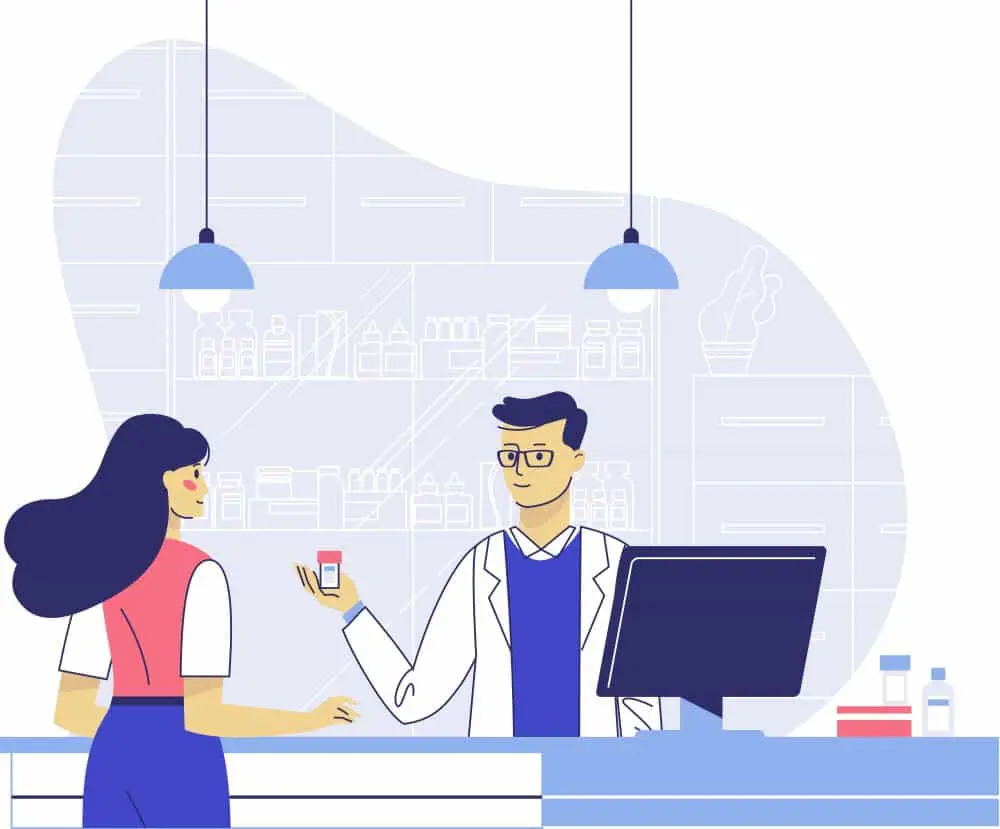
The Importance of Writing a Great Pharmacy Personal Statement
To become a pharmacist anywhere in the UK, you’ll need to be registered with the General Pharmaceutical Council (GPhC) and have, at minimum, a master’s degree from an accredited university. This requires you to enter into a graduate-level programme for pharmacology. When applying to these types of programmes, it’s very important that you have a strong pharmacy personal statement.
When it comes to applying to a pharmacy programme at the graduate level, there are many requirements to meet. Many of these come in the form of prerequisites you need before you can be considered for grad school.
Pharmacy Programme Prerequisites
The common prerequisites for applying to university for pharmacology mostly involve classes you should’ve taken before applying to the programme. These classes include three (3) A-levels in the following subjects:
- and various Maths
You must receive a grade of B or higher in each of these for it to meet the prerequisite.
You must also take five (5) General Certificates of Secondary Education, otherwise known as GCSEs, in the following subjects:
- Various Maths
- English/Language
For these courses, you must have received a grade of C or higher.
There are a few alternate routes you can take if you don’t meet the above listed prerequisites. These include having a foundational degree in the field of pharmacy, having an HNC, HND or BTEC with a science focus, having earned the equivalent qualifications at an Irish or Scottish university and a few others. Having work or internship experience with a pharmacist also helps.
Depending on the particular Uni you plan on attending, you may have some additional institutional requirements. These will be listed on the university’s website and/or in the admissions packet for the school.
Steps to Obtaining Admission
Once you’ve covered all your prerequisite courses, it’s time to start the actual process of admissions. Do your research first; find the best Uni for you and check the website to see what types of admissions requirements they have in place. Some universities require you to take the PCAT (Pharmacy College Admissions Test) and earn a certain score before they’ll consider you for admission.
If you’ve not already taken the PCAT, though, check the admissions requirements for your particular Uni to see if you need to do so. Several universities across the country are eliminating the PCAT requirement, and there’s no reason to take it if it isn’t a requirement for your specific school. The next step is to fill out and submit an application to the school.
Applications require a lot of personal information, including your name, contact information, educational history, professional resume, personal and professional references, and a pharmacy personal statement, which is one of the most important parts of the application packet. Some universities require you to pay a fee or provide them with a fee waiver when submitting your application.
After you’ve submitted your application, it’ll be reviewed by the university’s admissions team. At this point, they may call you in for an interview . After that, you should be ready to enter the pharmacy programme.
But how do you make sure you get to the interview stage? Aside from having good grades and an impressive personal resume, writing an exceptional and memorable pharmacy personal statement is the best way to make sure you’re called in for that final step.
What is a Pharmacy Personal Statement?
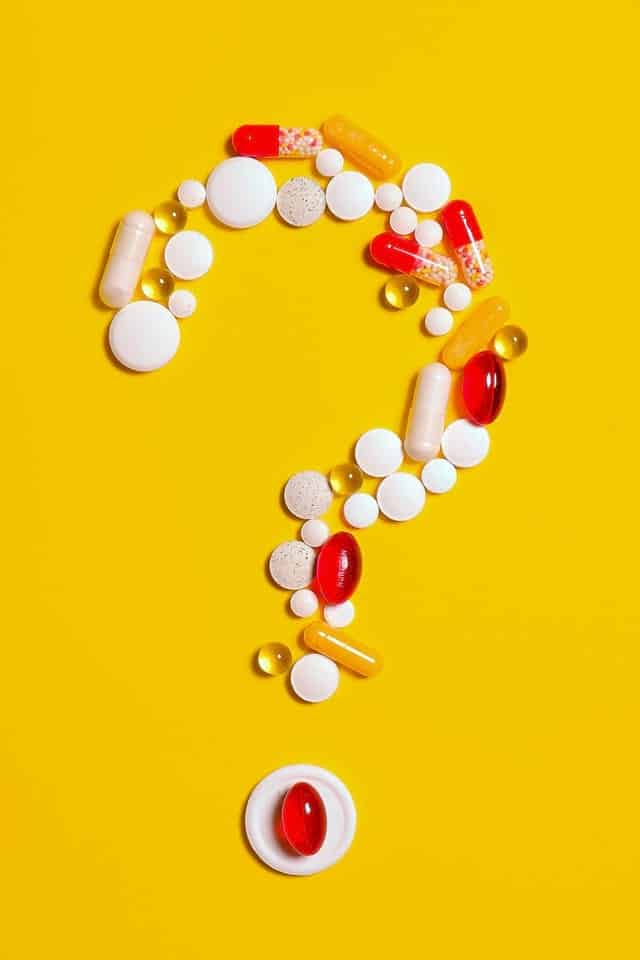
A pharmacy personal statement is a personal essay you write about yourself. Many unis will give you a specific prompt to help guide your writing. For those few that don’t, there are several things you’ll want to include , such as why you want to pursue pharmacology, what about that particular university’s programme appeals to you, any achievements or awards you’ve received, any relevant internship or work experience and why you’d make a good candidate.
There are also attributes about yourself you’ll want to mention in your personal statement. These are things you can’t simply write out in sentences. Instead, you’ll want to discuss relevant topics and tell personal stories that show that you have these qualities without you directly saying, “ I work well with others and have good communication skills. “
These important attributes include, but aren’t limited to:
- Excellent people skills
- Strong attention to detail
- Honesty and integrity
- Good communication skills
- The ability to work on a team
- Leadership skills
- Strong organisational skills
- Highly motivated to succeed
- A strong sense of responsibility and professionalism
All of these qualities make you a good candidate for a pharmacy programme. The more of these you can show you have, the more likely you’ll be called for an interview.
What is a Prompt, and Why Should You Follow It?
If your specific university provides you with a prompt, they’re simply giving you a question to help focus what you write about in your personal statement. There are several different prompts unis use, and we’ll discuss some of the most common of those later.
No matter what the prompt is, it’s important you answer it completely. Most universities use prompts relative to your interest in pharmacology, your educational history, or attributes that would make you a good candidate for their programme. There will occasionally be a prompt that surprises you though. In those cases, still, answer the prompt.
Be as honest and as thorough as you can, and remember, even if the prompt is something strange or unusual, there are usually still ways to work in stories that show you in your best light. You may just have to be a little more creative.
Below, you’ll find a few of the most common prompts for writing your pharmacy personal statement on your admissions applications.
Pharmacy Personal Statement Prompts
Prompt 1: tell us about yourself (kings university london).
Many universities use a very vague prompt that just instructs you to talk about yourself. As Kingston University London puts it, “You are the main topic of this essay.”
This is a great, easy prompt to get. Don’t be afraid to be honest and really talk yourself up in this kind of statement.
For this particular prompt, you’ll want to cover everything we mentioned above, particularly why you’re interested in pursuing a career in Pharmacy, what education you’ve had that qualifies you for the programme, any relevant work or leadership experience that would make you a good candidate and anything that showcases the attributes we listed above.
Again, be honest and as thorough as possible. Remember, the goal of this statement is to make you memorable and desirable. As a result, talking about all the great accomplishments or achievements you have isn’t bragging or boasting. It’s what’s required if you want to stand out from the other applicants.
Prompt 2: Demonstrate your commitment to pursuing a career in Pharmacy, and tell us why you’re better suited to the programme than other applicants (King’s College London).
This prompt is quite similar to the above “Tell us about yourself” prompt. In it, you’ll cover much of the same things, especially when you start talking about why you should be chosen for the programme over other applicants.
Just remember that there’s a direct question about why you want to work in pharmacology. Because it’s being asked directly, you want to spend a bit of time giving a complete answer. You can talk about why you became interested in pharmaceuticals in the first place. Was there a specific event in your childhood that inspired you to want to help take care of sick people? Have you had a strong love of chemistry for as long as you can remember? What inspired you to choose this field over all the over available career fields?
This prompt also allows you to talk about your career goals. What do you want to do with your MPharm once you get it? How is this degree going to help you in those goals, and how are you going to use your skills and your degree to make the world better once you do get a job? It would also benefit you to talk about the classes you’ve already taken and the work you’ve already done to work towards your goals.
Prompt 3: What benefits do you expect to gain from admission into our programme? (Cardiff University)
For this prompt, you can still talk a little about why you chose pharmacology and what you hope to do with your degree once you’ve earned it. More importantly, though, you’ll want to answer the actual question the prompt asks. What are you hoping to gain from this particular programme that sets it apart from all the other pharmacy programmes you could have chosen instead?
Talk about specific courses or labs for which this programme is well-known. This is a great way to showcase that you’ve done your research and really looked into what this university has to offer. By highlighting particular aspects of the programme, you prove to the admissions team you didn’t just pick this university on a whim or because it was the closest one to your flat. Instead, you did some reading and compared the programme to those at other schools and decided this one was the best fit for you because… You fill in the blanks!
Proving to a school that you know something about the school and that you hope to gain the actual knowledge and skills they’re famous for providing to students is a huge point in your favour. This specific prompt allows you to do that.
Prompt 4: Tell us about any work experience, internships, leadership positions you’ve held or outside activities that would support your application for admission (The University of Manchester).
This prompt is another one that’s similar to the “ Tell us about yourself ” prompt. In answering this prompt, you’ll be able to talk about yourself, your history, your past accomplishments, your interest in pharmacy, and more. You’ll want to put your largest focus, though, on the actual work you’ve done to prepare you for entrance into this programme.
This could include any of the following:
- Working in an actual pharmacy or closely related field
- Internships, volunteer experience or other placements within a pharmacy or related field
- Any work experience you’ve had where you were part of a team or, even better, the leader of a team
- Educational experience that would prepare you for the programme
- Any honours you’ve received that show you to be exceptional in any relevant field
These are only a few examples of things you could discuss in response to this prompt.
Standard Pharmacy Personal Statement Format
No matter the specific prompt you’re given, there’s a general format you’ll use for most personal statements. Occasionally, a university will provide you with specific formatting instructions. If they do, you always want to follow those instructions exactly. If you aren’t provided with instructions, this is the general format preferred for most UK unis and their US counterparts for essays and/or personal statements:
- MLA formatting guidelines
- One-inch margins on each side of the page
- (For the UK) Any professional font as long as the italics are noticeably different – most students use Times New Roman, Arial or Courier
- (For the US) Times New Roman or Arial font
- Font size – 12 pt.
- Double-space, but add no extra lines between paragraphs
- Indent the first line of each paragraph
Additionally, you’ll use the standard Intro-Body-Conclusion format that most MLA essays utilise.
Step 1. Introduction
Depending on the specific prompts people are given, each introductory paragraph will be a little different for each student. Generally, though, this is where you’ll introduce yourself and talk a little about why you’re interested in studying pharmacology in general and why you’re interested in studying at that university specifically. You’ll also want to catch the reader’s attention immediately, in the opening line if possible, but without using gimmicks or something overly dramatic.
According to a how-to guide on the Birmingham City University website , “The most effective opening sentences are simple, to the point and personal to you.”
You’ll also want to avoid writing in cliches or using overused phrasing that everyone else uses. Be original. Be specific. Really help the admissions team understand your drive and passion for pharmacology.
Step 2. Body Paragraphs
Your body paragraphs are where you’ll put the majority of your information. These are the paragraphs where you’ll really dive into answering the question(s) the prompt asks. Unless you’re asked to write an abbreviated personal statement of just a couple hundred words, you should never have less than two body paragraphs, and it’s better to have between three and six.
You want to be comprehensive in your writing; include everything the admissions team might need to hear to sway them in your favour. This generally takes more than a couple of short paragraphs. Remember to indent the first line of each paragraph, and make sure they’re written in an order that makes sense. Don’t jump around from paragraph to paragraph. Make sure each transitions smoothly into the other.
Step 3. Conclusion
In the conclusion of your pharmacy personal statement, you’ll want to bring your entire essay to a smooth, sensible close. Don’t use your conclusion to restate everything you’ve already written. Instead, use it as a place to briefly touch on how entrance into the programme will help you succeed in your future goals.
Also, if it feels appropriate and doesn’t detract from the overall feel of your personal statement, take the time to thank the admissions team for reading it and considering you for application into their school’s pharmacy programme. Be aware that this isn’t always appropriate. If, after adding in the thank you, it seems forced or like it was written just to add more words to an essay that was a little too short, take it out.
Examples of Pharmacy Personal Statements
Example personal statement 1.
“I have gained valuable knowledge studying Chemistry, Biology and Maths which will be beneficial for the Pharmacy course. In Chemistry, I have done a series of experiments which require analytical and evaluative skills such as accurate reading when using burettes. I find the organic Chemistry module rather interesting as I enjoy studying the different reactions of aldehydes and ketones and how these reactions and organic products differ due to the different functional groups present in each compound. Another aspect of chemistry I enjoy is the purification of organic compounds.”
– Read the rest here
This is the second paragraph of a pharmacy personal statement, and it’s a great example of how to answer a prompt that wants you to discuss any relevant experience you’ve had that could help you in the programme.
This student mentions many of the different science and mathematics courses she’s taken in pursuit of her pharmacy degree, but she doesn’t just list them. She goes into great detail about some of the things she’s done in those classes.
This is excellent for a few reasons. First of all, it’s evident in her writing that she greatly enjoyed the classes she took. This shows that she has a passion for the work she’ll have to do to obtain her MPharm. Universities much prefer to have students on campus who are truly invested in and enjoying the work they’re doing.
Additionally, she uses specific terms – “ketones,” “burettes,” “aldehydes” and more – which shows she has actual knowledge and understanding of the field. We can tell that she’s a knowledgeable, hard-working student who has, thus far, retained the information she learned in her undergraduate courses. Everything about this personal statement was done well.
Our Verdict:

Example Personal Statement 2
“I am interested in the Masters of Pharmacy (MPharm) Programme because I am interested in the modules on which it is based. I want to do the MPharm programme so as to extend my knowledge in Medicines. I would like to get a deeper understanding of how to formulate and administer drugs safely.
I would qualify for the Mpharm programme because I have recently completed BSc in pharmaceutical Science which has given me good understanding of how drugs work. The modules I have undertaken In my BSc Pharmaceutical Science will help me navigate successfully in the MPharm programme.”
This personal statement is a little less impressive than the first one. First of all, there’s not really an opening line. When writing a pharmacy personal statement – or a personal statement of any kind, for that matter – you want to have a nice first sentence that breaks the ice and starts the statement off in a fluid manner. This student just jumps right in and answers the question being asked. There’s no lead-in, no story being told.
The grammar in this particular sample isn’t great either. There are randomly capitalised words (“undertaken In my BSc”) and missing words (“given me good understanding”) and a few other problems that could have been addressed by good editing. This is a testament to why you should always proofread and edit your papers before submitting them. It’s even better to give them to a new set of eyes to edit for you if possible.
The two most bothersome things about this sample, though, is that it’s vague, and the sentences are choppy. The student mentions things he’s done (“ recently completed BSc in pharmaceutical Science “) and why he wants to be in the programme (“ because I am interested in the modules on which it is based “), but he gives absolutely no specifics.
He doesn’t talk about anything he learned in his BSc courses that furthered his love of pharmacology, and while he says he’s interested in the programme’s modules, he doesn’t mention a single specific module or why it interests him. We’re just given the bare minimum with no detail – the burger without the cheese and veggies. It’s boring.

Finally, his sentences are horribly choppy. With the exception of one single sentence, each of his sentences starts with the word “I” – “I am,” “I want,” “I would.” There is no variation at all to his writing. It’s boring and makes the reader lose interest. You’ll want to change up the flow and style of your sentences regularly. It adds a little flair and makes your personal statement less monotonous.
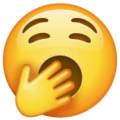
Example Personal Statement 3
“Pharmacy has the ability to change people’s lives. Whether it is at the level of the community pharmacist offering the best advice possible to common illnesses, to high-level research into drugs that could cure a range of chronic or life-threatening diseases, the role of the pharmacist cannot be overestimated. As a motivated and hardworking individual, with a desire to understand the fascinating human body along with a joy of helping other people, I strongly believe that studying pharmacy will give me one of the final and most important step towards a rewarding career in the developing field of pharmacy.”
This is another stellar example of what a pharmacy personal statement should be. The writer begins strong with a unique and memorable opening sentence. He tells us, right from the first sentence, one of the reasons he wants to work in the field of pharmacology, but he does so without monotonously and obviously saying, “ I want to be a pharmacist because I think pharmacy can change people lives .” Instead, he simply and concisely says, “ Pharmacy has the ability to change people’s lives. “
It’s a great opening line, and it gives us insight into his reasons for going into the pharmacy field as well. He follows that up with a sentence that shows he’s knowledgeable about different career opportunities in the field of pharmacology.
Then he smoothly transitions into why he, himself, would do well in this field. He tells us he’s hardworking and motivated, but he does so in a way that doesn’t just state those facts outright without context.
He then once again tells us about his interest in the field and also shows us he is someone who enjoys working with and helping others. Finally, he sums up his introduction by leading into what he hopes to gain from the programme.
Although the next paragraph isn’t listed here, it, too, is a smooth transition into the educational and work experiences he’s had that prepared him to do well in the programme. Everything about this personal statement is well-organised, with each paragraph flowing smoothly into the next, and the whole thing covering everything that should be covered in a personal statement.

Example Personal Statement 4
“I am interested in studying chemistry and biology because I would like a career that plays crucial role in public’s health.
I was previously working as a retail assistant and the experience has led me to deal and understand different kind of people. I learnt to keep myself calm, whilst working under pressure environments.
This job has also taught me to work in a fast-paced environment to meet the customer`s demands. This skill will be useful to meet the deadlines while doing my course and working as a pharmacist will enable me to provide good customer services.”
This personal statement is another example of what not to do when writing your own statement for admission into the pharmacy programme.
First of all, the introduction paragraph, shown here in its entirety, is much too short. You have to be an excellent writer to turn one sentence into a paragraph and make it work, and this writer didn’t do that. Your introduction should never be only one sentence. It needs to be fleshed out and thoroughly written. There are some glaring grammatical errors as well.
The next problem with this statement is that the work experience the student writes about isn’t really relevant to the programme she’s trying to enter into. She does an admirable job of trying to make it relevant, by talking about how it helped her learn to work with a multitude of different people and taught her to work quickly, but it doesn’t really work.
Most unis want to know that you have relevant work experience. If you don’t, it’s better to mention placement experiences or internships you’ve had that are relevant as opposed to irrelevant work experience. Even if you only worked in a pharmacy for a day as part of a class project, that’s okay. You can learn a lot in a day, and you can make that work in your writing.
Unless you’re really good at making non-relevant experience seem like it has actual relevance to the programme, it’s better to leave it out altogether. That’s not to say you can’t mention having retail or fast food experience, but you have to make sure that you meticulously explain how that experience is relevant to the pharmacology field.
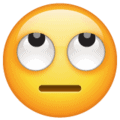
Example Personal Statement 5
“The enthusiasm I have for the sciences – specifically Chemistry – encouraged me to think about my future career and how a chemistry-related degree could be a possibility for me. I have always enjoyed maths and science throughout my education and I have recognised that I can combine both in a career in pharmacy. I believe pharmacy to be a fast-developing profession and recognise that pharmacists are heavily involved in the introduction of new medicines for all kinds of illnesses, and I find the prospect of working in this field inspiring.”
While this isn’t the best example of a personal statement, it’s far from being the worst. This is considered an average statement. The writer does a good job hitting all the points he should cover in his introduction – why he became interested in the field of pharmacy, a basic knowledge of the job description of a pharmacist and why he wants to work in the field in the future – but doesn’t do it in a way that’s incredibly memorable.
It isn’t the strongest introduction paragraph to a personal statement, but at the same time, it’s fair; it isn’t bad. It’s well-organised; the grammar is mostly as it should be, and the subject of why he wants to enter the programme is well covered. It doesn’t grab our attention and make us want to read more though. In short, this is an introductory paragraph that could go either way.
Although not shown here, the rest of this statement turned out pretty good. The writer found his flow and dived into the subject with an appropriate amount of detail, good grammar and a few memorable points. The strength of his body paragraphs and conclusion made up for his less-than-exceptional introduction, and that’s okay.
We included this sample to show that sometimes you get off to a bit of a slow start and can still finish well. It’s better to start strong, but introductions can be tough. As long as the intro isn’t bad and you make up for the average intro in your body paragraphs and conclusion, you’ll usually be okay.

A Few Final Notes
hile it’s certainly true that grades and work experience are important when applying to uni to work on your MPharm, your pharmacy personal statement is equally important. Universities get huge volumes of applications for their pharmacy programmes. They get so many applications that many of them have a “Due to the large volume of applications we receive…” disclaimer on their websites.
Your personal statement is where you can be creative and ensure your essay stands out from the rest. Be sure you check out the formatting requirements ahead of time and stick to them exactly.
Also, make sure you read the personal statement prompt well and understand it before you start writing. Finally, make sure you edit your paper several times before submitting it.
Have a friend, loved one, mentor or former professor look over it as well. Where possible, get a reputable online personal statement review service to help ( me shamelessly plugging in our services page lol ) Sometimes, a fresh set of eyes can find mistakes your own eyes can’t.
Be honest and thorough in your response to the prompt, and never try to plagiarise someone else’s work. It never works. It helps to run a plagiarism checker on your final draft- just to be sure!
Finally, be sure you stick to the length requirements. If the statement is supposed to be between 500 and 750 words, make sure that’s what it is. Don’t stop at 490 words and assume it will be enough, and don’t go over an extra 50 words and assume the admissions team will be okay with it. These people read a lot of personal statements; they set a maximum word count for a reason.
Most importantly, do your best, and fill your personal statement with passion. If an admissions team can tell that you’re passionate about your education and your subsequent career in pharmacy, you’ve already won half the battle.
13 Best Books for Nursing Students to Read- Reviewed
5 Best MCAT Prep Books, According to Med Students
5 Best MCAT Prep Courses, According to Med Students
Leave a Comment Cancel reply
Save my name, email, and website in this browser for the next time I comment.
This site uses Akismet to reduce spam. Learn how your comment data is processed .
Advertise With Us
Advertising Disclosure
Privacy Policy
Cookie Policy
As an Amazon Associate (and a participant of other affiliate programs), this site earns from qualifying purchases.
© 2024 TheCollegeApplication.com, a Delicto Holdings Company | All Rights Reserved
Clearing Universities & Courses
Clearing advice.
Recommended Clearing Universities
Popular Course Categories

Course Search & Discover
Start the search for your uni. Filter from hundreds of universities based on your preferences.
Search by Type
Search by region.
Recommended Universities

Ravensbourne University London
London (Greater) · 88% Recommended

SOAS, University of London
London (Greater) · 90% Recommended

University of Roehampton
London (Greater) · 95% Recommended
Search Open Days
What's new at Uni Compare

University of Sunderland
Sunderland is 1st in the north-east for teaching and student experience (GUG, 2023).

Study at the largest provider of legal education in the UK (HESA 2021/22) at ULAW!
Ranking Categories
Regional rankings.
More Rankings

Top 100 Universities
Taken from 65,000+ data points from students attending university to help future generations

About our Rankings
Discover university rankings devised from data collected from current students.
Guide Categories
Advice categories, recommended articles, popular statement examples, statement advice.

What to include in a Personal Statement

Personal Statement Tips
Personal statement example pharmacy personal statement.
Submitted by Sonal

Pharmacology will give you a range of career options
Gain a highly sought-after qualification by studying Pharmacology and benefit from the state-of-the-art STEM labs at Bedfordshire.
Pharmacy Personal Statement
I am interested in pursuing a career in Pharmacy as I have a passion for helping people and a desire to make a difference in people's lives. The physiological aspects of Biology and the use of chemicals in these systems gives me a thirst to learn more. A topic in Biology which sparked my interest in Pharmacy was disease. It is enthralling to study how our bodies work and how they are complex enough to fight diseases through our immune system. Biology explains biological processes affecting health and provides me with the knowledge of how diseases are caused and how certain diseases can spread. All this is necessary to better understand how different medications work and have their effect on our bodies. The crossover of Chemistry and Biology display the importance they both have in the world today. For instance, in respiration, to know the biological processes involved in Glycolysis, you need to understand the chemical reactions behind it. Chemistry is at the route of Pharmacy and the Pharmaceutical Industry; the understanding of organic chemistry, for example alkanes and alkenes, is vital to make medicines. Pharmacists are not only concerned with how chemicals affect the body, but also, how the chemicals interact with each other.
During my gap year, I have further understood the work of a pharmacist and gained further experience at my local chemist. I have learnt that pharmacists play a vital role in Primary Healthcare. As well as being experts in dispensing medications, they provide advice on many conditions such as diabetes, obesity and anti-smoking techniques to mention a few. Medication is the most common form of treatment of disease, and I believe without having the expertise from Pharmacists, who check prescriptions are in the correct dose for the correct conditions, mistakes might go unnoticed. Whilst working at the chemist, I realised how complex the role of a Pharmacist is. On the one hand, they need to deal with suppliers and the other hand with patients. One minute they are advising a customer about a skin condition and the next they are directing customers to goods on the shop floor. A Pharmacist needs strong analytical and problem-solving skills with an ability to be precise and methodical. By studying Biology and Chemistry and working in the College laboratory, I have gained some preliminary experience in these areas.
I am also currently working in Primark as a retail assistant. This involves working in a fast-paced environment working alongside my colleagues to provide the best customer service possible. I regularly interact with customers which further developed my interpersonal skills. Reading the Royal Pharmaceutical Society Blog has further developed my interest and passion in Pharmacy. This blog provides information on health and reading people's viewpoints informs me about the different ethical issues surrounding medicines and medication. Previously joining a Debating Society developed my critical thinking skills and gave me confidence. I realised, listening is as important as speaking when it comes to communication. Completing the Duke of Edinburgh Bronze Award involved volunteering at Princess Alice Hospice, where I developed my time management and organisation skills. Additionally, being a prefect at College required being a role model to other students and working together with other prefects as part of a team, helping out at College events, where I developed a sense of responsibility that enhanced my leadership skills. I also have a passion for travelling and exploring different countries and their cultures, this helps me build relationships with people from diverse backgrounds.
I would say I am hard-working, focused and dedicated to study Pharmacy at university. I am keen to enhance my knowledge in the field of Pharmacy. I look forward to the challenges ahead and hope to participate fully in university life.
Recommended Course

Recommended Statements
Submitted by anonymous
My fascination in Pharmacy began when shadowing a Pharmacist on a hospital ward. It highlighted to me the ...
Mharm (Pharmacy) Personal Statement
Reading the uses, interactions and side-effects of a drug was what instigated my interest in pharmacy. Res...
Submitted by Hasnan
Pharmacy (Masters) Personal Statement
Why Pharmacy? I considered a range of medical career options but after attending the science live conferen...
Submitted by Imaan
Pharmacy MPharm Personal Statement
My experience of shadowing a community pharmacist was a watershed in which I realised the full extent of r...
undergraduate Universities
Undergraduate uni's.

Ravensbourne

238 courses

Uni of Roehampton
268 courses
.jpg)
Uni of Sunderland
200 courses

Uni of East London
317 courses

Uni of Winchester
154 courses

Cardiff Met Uni
305 courses


Uni of Chester
398 courses

Northeastern Uni

Goldsmiths, UOL
273 courses

Uni for Creative Arts
323 courses

Heriot-Watt Uni
208 courses

Middlesex Uni
470 courses

Coventry Uni
445 courses

Leeds Beckett Uni
325 courses

Uni of Surrey
435 courses

Uni of Hertfordshire
419 courses

Queen's Uni
411 courses

Staffordshire Uni
272 courses

Uni of Westminster
336 courses

Uni of Bradford
197 courses

444 courses

Uni of Leicester
267 courses

528 courses

Uni of Suffolk
111 courses

Uni of Bedfordshire
327 courses

Uni of Kent
413 courses
,-Bristol.jpg)
UWE, Bristol
252 courses

Swansea Uni
771 courses

Kingston Uni
376 courses

Uni of Portsmouth
545 courses

Anglia Ruskin Uni
464 courses

Uni of Essex
797 courses

Leeds Arts University

West London IoT

ARU Writtle
104 courses

Escape Studios

353 courses

Uni of Huddersfield
458 courses

Uni of Brighton
257 courses

Wrexham Uni
168 courses

Uni of C.Lancashire
512 courses

Bath Spa Uni
292 courses

Edge Hill Uni
243 courses

Uni of Hull
274 courses

Nottingham Trent
539 courses

Edinburgh Napier
184 courses

Uni of Reading
391 courses

246 courses
Find the latest from Uni Compare

Middlesex University
Study at Middlesex Uni, a global university renowned for innovation in education.

Cardiff Met University
Cardiff is the second most affordable city in the UK (Student Living Index 2023)

35 Impressive Pharmacy Technician Resume Objective Statement Examples
Most people don’t realize how effective a well-thought-out objective statement can be when they apply for a position as a pharmacy technician. The reality is that due to the volumes of resumes that a recruiter receives, an objective statement can mean the difference between getting an interview or not. Even if the rest of your resume has been edited to perfection, many recruiters won’t read further than the objective statement if it didn’t entice them to read further.
Here are some examples of powerful objective statements for pharmacy technicians:
Experienced Pharmacy Technician Objective Statements
- Detail-oriented pharmacy technician with three years’ experience seeking role of Certified Pharmacy Technician, bringing proven capabilities in maintaining adequate stock levels, filling medication orders accurately, monitoring refrigeration temperature logs, and operating all equipment efficiently.
- Highly talented pharmacy technician looking to work in a hospital setting, coming with a CPhT certification and three years of experience performing various technical and administrative tasks related to the preparation and distribution of drugs.
- Seeking role of Pharmacy Technician at XYMedT, bringing two years’ experience and desire to complete tasks flawlessly, with ability to work shifts over weekends and fill and deliver orders when required.
- To obtain a pharmacy technician position in an in-patient setting and become an integral member of a team providing care and treatment to patients, bringing GED, driver’s license and Pharmacy Technician license.
- Highly motivated and ethical self-starter with five years’ experience in the medical industry applying for pharmacy technician position, to be part of the clinic team and serve patients face-to-face and telephonically, identifying trends and recommending effective improvements.
- Hardworking and devoted medical professional with CPhT degree and seven years’ experience in pharmacy, looking to fill position of Pharmacy Technician at NarCto, bringing experience in maintaining levels of supplies, reconciling accounts, and assisting with any other duties required.
- Computer and math literate pharmacy technician with four years of experience looking for position in a retail pharmacy where attention to detail, integrity, commitment to customer service, and PTCB certification can be utilized.
- To obtain a pharmacy technician position at a growing company of passionate people, bringing two years’ experience, ability to perform all duties in line with control standards, and ability to coordinate daily workflow effectively.
- Experienced PTCB certified self-starter seeking pharmacy inventory technician role where attention to detail and teamwork skills can be utilized in maintaining inventory of medications and supplies. Clean background and drug screens.
- Certified pharmacy technician with five years’ hospital pharmacy experience, seeking position of Pharmacy Technician at XYZ Ltd. to leverage exceptional communication and precision skills in performing all store duties and deliver medications to patients.
- Licensed technician seeking a pharmacy technician position, bringing three years’ experience and dedicated attitude in daily duties, ensuring safety and cleanliness of work environment, and participating in all scheduled inventories.
- Customer-centric self-starter desiring position of pharmacy technician in a retail setting bringing six years of experience, technical capabilities, ethical conduct, thoroughness and effective communication. Certified by a pharmacy technical training program.
- To provide support for formulary management and assist customer service with drug-related queries in the role of Pharmacy Technician at PebbleMed, bringing 10 years’ experience, CPhT, and effective communication, time management, and organizational skills.
- Customer service-oriented team player with three years’ front-office experience in pharmaceutical industry brings strong desire to assist people as well as excellent conflict and problem-solving skills to the position of pharmacy technician.
- Effective communicator with seven years’ experience as pharmacy technician is seeking Senior Pharmacy Technician position at OralXY to provide supervision to trainees, assign duties, provide feedback to supervisor, and coordinate the procurement of inventory and supplies.
- Looking to utilize five years’ pharmaceutical background and strong knowledge of medications in the role of pharmacy technician, filling orders, optimizing inventory levels, operating mechanical and electrical equipment, and maintaining a safe working environment.
Entry-Level Pharmacy Technician Objective Statements
- Diligent and detail-oriented individual in possession of valid pharmacy technician license looking to start career as Pharmacy Technician at LTVerd, bringing excellent typing and customer service skills to process prescriptions and verify patient information.
- Seeking pharmacy technician position in a hospital setting, coming with the highest integrity and a commitment to creating exceptional experiences for patients. Has pharmacist intern license and pharmacy sterile product certification.
- To obtain the position of pharmacy technician, applying the knowledge obtained during the PTCB certification process, bringing a high stress tolerance, physical stamina, and dedication to excellent customer service.
- Compassionate customer-focused individual looking to secure Pharmacy Technician position at CZX Pharmacy, helping people on their path to better health, bringing energy, integrity, math and computer skills, and the ability to learn quickly.
- Highly ethical team player with strong drive and attention to detail seeking a position as pharmacy technician to use analytical ability and communication skills to fill scripts, complete data entry, and provide courteous customer service.
- Senior-year pharmacy student at PLM University (current GPA: 3.7), looking to join ChemYZT as a Pharmacy Technician after graduation. Seeking to leverage deep knowledge of pharmaceuticals and long-term vision to create a rewarding career within the company.
- To obtain the position of pharmacy technician in a fast-paced retail setting, bringing attention to detail, integrity, and ability to learn quickly, holding an active certification issued by PTCB.
- Physically fit, PTCB certified team player looking for pharmacy technician role in a retail setting, bringing ability to create genuine human connections by focusing on service and keeping customers top of mind at all times, as well as eagerness to actively expand clinical, technical and insurance knowledge.
- Licensed pharmacy technician seeking to start a career as a pharmacy technician in a fast-paced environment, bringing quick-thinking, motivated attitude to grow, a patient attitude, and service orientation.
- To contribute to a positive work environment at LKMPharm as a Pharmacy Technician, with high school diploma, pharmacy technician license, and ability to work effectively with others, bringing typing skills of 60 wpm to assist with fast data entry.
- Hardworking and detail-oriented team player looking for a pharmacy technician position, bringing excellent verbal and written communication skills, fast problem-solving skills, and upbeat positive attitude.
- To obtain the job of Pharmacy Technician at QZChem and be an effective member of the pharmacy team while executing all inventory, packaging, and reconciliation duties with a happy and can-do attitude.
- Pursuing a pharmacy technician career to exploit interest in medicine and ambition to learn, to assist a registered pharmacist in the preparation and distribution of pharmaceuticals, willing to go for further training and work after hours on little notice.
- Detail-oriented and analytical high school graduate seeking employment as Pharmacy Technician at LBMed, bringing proficiency with computers, experience with keeping ledgers, and a strong desire to grow in the company by helping it achieve its goals.
- Licensed pharmacy technician with high school diploma seeking to use customer service skills and a patient attitude to exceed expectations in the duties of pharmacy technician, processing prescriptions and resolving insurance billing issues.
- Applying to work at HartoCo in the capacity of Pharmacy Technician, to leverage compassionate and motivated personality to forge a rewarding career with the company, bringing a courteous and professional attitude to interact with customers and staff.
Career Change Pharmacy Technician Objective Statements
- Reliable and trustworthy administrative assistant with two years of experience in a treatment center, pursuing position of pharmacy technician to benefit the company through effective customer service, proven ability to maintain inventory levels, and effective organizational skills.
- To leverage my five years of client relationship management experience, excellent writing ability, and facilitation skills in the pharmaceutical industry in the Pharmacy Technician role at Tab Trading Co.
- Confident and effective sales associate with three years’ experience in the medical insurance industry seeking to begin career as a pharmacy technician to assist supervisor with all duties, bringing an improvement-focused approach and eagerness to learn.
Executing the perfect objective statement is about focusing on what the company wants, what your skills are, and how your skills can help the company. It also helps to highlight your experience and if you are licensed. The next time you send your resume in for a pharmacy technician position, make sure you craft your objective statement so that the recruiter will immediately notice that you read the job description well, and then watch what happens.

- Applying to Uni
- Apprenticeships
- Health & Relationships
- Money & Finance
Personal Statements
- Postgraduate
- U.S Universities
University Interviews
- Vocational Qualifications
- Accommodation
- Budgeting, Money & Finance
- Health & Relationships
- Jobs & Careers
- Socialising
Studying Abroad
- Studying & Revision
- Technology
- University & College Admissions
Guide to GCSE Results Day
Finding a job after school or college
Retaking GCSEs
In this section
Choosing GCSE Subjects
Post-GCSE Options
GCSE Work Experience
GCSE Revision Tips
Why take an Apprenticeship?
Applying for an Apprenticeship
Apprenticeships Interviews
Apprenticeship Wage
Engineering Apprenticeships
What is an Apprenticeship?
Choosing an Apprenticeship
Real Life Apprentices
Degree Apprenticeships
Higher Apprenticeships
A Level Results Day 2024
AS Levels 2024
Clearing Guide 2024
Applying to University
SQA Results Day Guide 2024
BTEC Results Day Guide
Vocational Qualifications Guide
Sixth Form or College
International Baccalaureate
Post 18 options
Finding a Job
Should I take a Gap Year?
Travel Planning
Volunteering
Gap Year Guide
Gap Year Blogs
Applying to Oxbridge
Applying to US Universities
Choosing a Degree
Choosing a University or College
Personal Statement Editing and Review Service
Guide to Freshers' Week
Student Guides
Student Cooking
Student Blogs
Top Rated Personal Statements
Personal Statement Examples
Writing Your Personal Statement
Postgraduate Personal Statements
International Student Personal Statements
Gap Year Personal Statements
Personal Statement Length Checker
Personal Statement Examples By University
Personal Statement Changes 2025
Personal Statement Template
Job Interviews
Types of Postgraduate Course
Writing a Postgraduate Personal Statement
Postgraduate Funding
Postgraduate Study
Internships
Choosing A College
Ivy League Universities
Common App Essay Examples
Universal College Application Guide
How To Write A College Admissions Essay
College Rankings
Admissions Tests
Fees & Funding
Scholarships
Budgeting For College
Online Degree
Platinum Express Editing and Review Service
Gold Editing and Review Service
Silver Express Editing and Review Service
UCAS Personal Statement Editing and Review Service
Oxbridge Personal Statement Editing and Review Service
Postgraduate Personal Statement Editing and Review Service
You are here
Pharmacy personal statement example 13.
Pharmacy has the ability to change people’s lives. Whether it is at the level of the community pharmacist offering the best advice possible to common illnesses, to high-level research into drugs that could cure a range of chronic or life-threatening diseases, the role of the pharmacist cannot be overestimated. As a motivated and hardworking individual, with a desire to understand the fascinating human body along with a joy of helping other people, I strongly believe that studying pharmacy will give me one of the final and most important step towards a rewarding career in the developing field of pharmacy.
My passion in my A-Level subjects has strengthened my decision to study pharmacy. This is due to the fact that they have provided me with a wide range of skills and knowledge required for a degree in pharmacy. The practical and theoretical sides of Chemistry have given me a clear understanding of the organic, inorganic and physical aspects of the subject. The preparation of Aspirin is a topic I have particularly enjoyed and has only increased my interest in the way drugs are developed. Applied science has again helped me to learn the practical side but has also helped me to hand in my work on time. The biology aspect has given me a basic understanding of the human body and how it responds to certain diseases and environments around us. Lastly, Maths has provided me with the skills to analyse and solve problems. I have also gained the skill of producing written and illustrated results for a mathematical problem. So using Maths, I am able to calculate the accurate dosage of the drug which is required for the patient in relation to pharmacy.
I have completed two weeks work experience at different primary schools which has given me the opportunity to enhance my people’s skills. During these two weeks I was given a responsible position of taking care of the children, ensuring they were safe during their free times and making sure they completed their school work correctly. Also I had worked alongside the staff to organize different activities for the children and did admin work for them as well. I feel like I have handled my responsibility well and that during these weeks my communication and interpersonal skills have been developed.
I believe myself to be an honest, motivated, and responsible individual who is able to keep information private. In any work I do I am thorough, logical and careful, with an eye for detail. I feel I am a physically stable individual who can handle pressure due to courseworks and assignments I have completed since secondary till now. Outside of school I enjoy reading a variety of books from different genres which include mystery and horror. I have taken part in projects such as the Brilliant club where I had to combine my love for the sciences with literacy. This has developed how I communicate through my writing. During secondary I have participated in various fundraising activities for different charities. From this I hope you find me as a person who can be easily involved in anything which means that I will be equally interested and involved during my course and the university life. I also feel that I am a mentally strong person with a quiet personality, who is keen and able to work independently. As an observer I can come to conclusions quickly by approaching any situation by using creative methods. As pharmacy requires me to work with a wide variety of people therefore excellent communication skills are crucial for this course and I believe I possess these skills.
I have found that the variety of skills and experiences that I have gained have helped me to become self-motivated and an enthusiastic individual. I feel I have a wide range of skills which will help me throughout my university experience and I am looking forward to starting the next stage in my academic life. I have a great determination to succeed in my ultimate goal, and would like to face the challenges of university life.
Profile info
There is no profile associated with this personal statement, as the writer has requested to remain anonymous.
Author's Comments
Hi this is my draft personal statement. I would like soem help and tips on this please
This personal statement is unrated
Related Personal Statements
Add new comment.
Build my resume
- Resume builder
- Build a better resume in minutes
- Resume examples
- 2,000+ examples that work in 2024
- Resume templates
- 184 free templates for all levels
- Cover letters
- Cover letter generator
- It's like magic, we promise
- Cover letter examples
- Free downloads in Word & Docs
11 Pharmacy Technician Resume Examples for 2024
Pharmacy Technician
Best for careers that encourage creativity.
Browsing for creative resume templates? In graphic design, photography, or event planning? Make a statement with this modern resume.
Resume Builder
Like this template? Customize this resume and make it your own with the help of our Al-powered suggestions, accent colors, and modern fonts.
Pharmacy Technician Resume
- Entry-Level Pharmacy Technician Resumes
- Specialized Pharmacy Technician Resumes
Writing Your Pharmacy Technician Resume
Whether you’re starting your healthcare career as a pharmacy technician or have years of experience as a retail or hospital pharmacy technician, it’s a challenge knowing what to include on a resume, how to format it, and whether to use a free cover letter generator to attract the attention of a hiring manager.
We analyzed countless resumes from all stages of pharmacy technician careers and learned what works to help you get more interviews in 2024. We created 11 pharmacy technician resume samples to help professionals like you build eye-catching resumes .
The hardest part of resume writing is getting started. These resumes helped pharmacy technicians find jobs in retail, inpatient, hospital, and long-term care facilities. We’ve got you covered!
or download as PDF
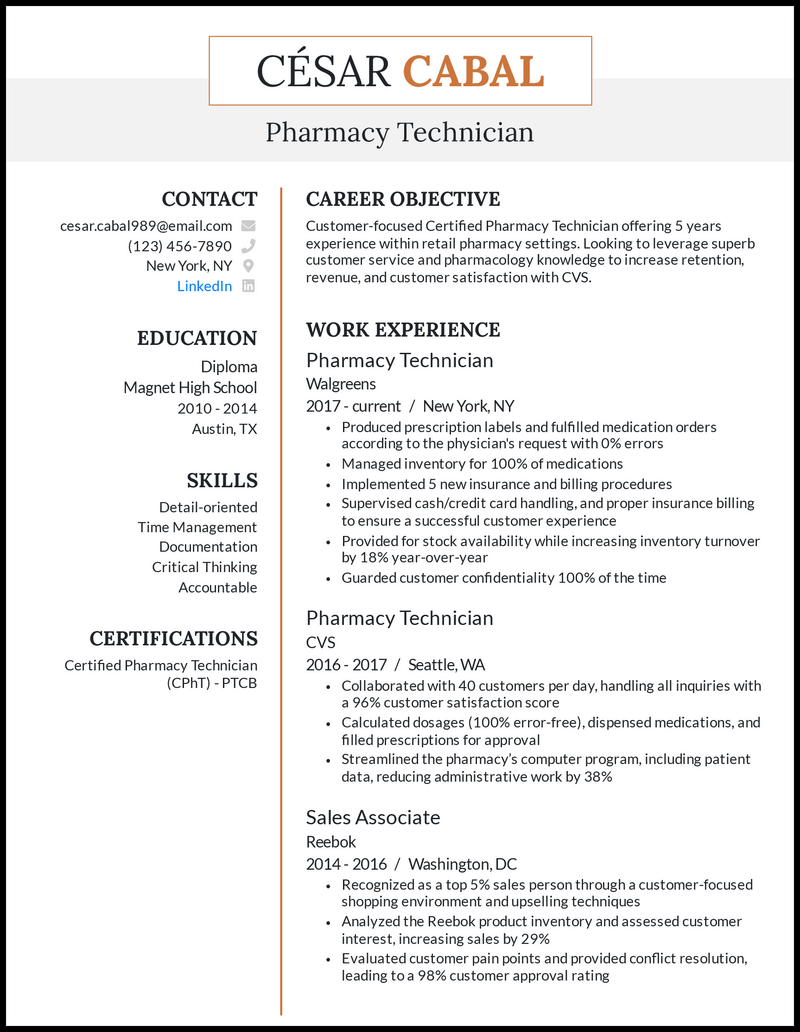
Why this resume works
- If you work or are planning to work in a retail pharmacy, be ready to highlight your customer service skills and positive attitude.
- Show the hiring manager, through your pharmacy technician resume, that you’re comfortable being both a patient advocate and a trustworthy cashier.
- Use numbers and percentages to prove any process improvements or initiatives taken in your roles that helped the pharmacy and its patients.
- Don’t be shy about showcasing your skills on your resume !
Entry-Level Pharmacy Technician Resume
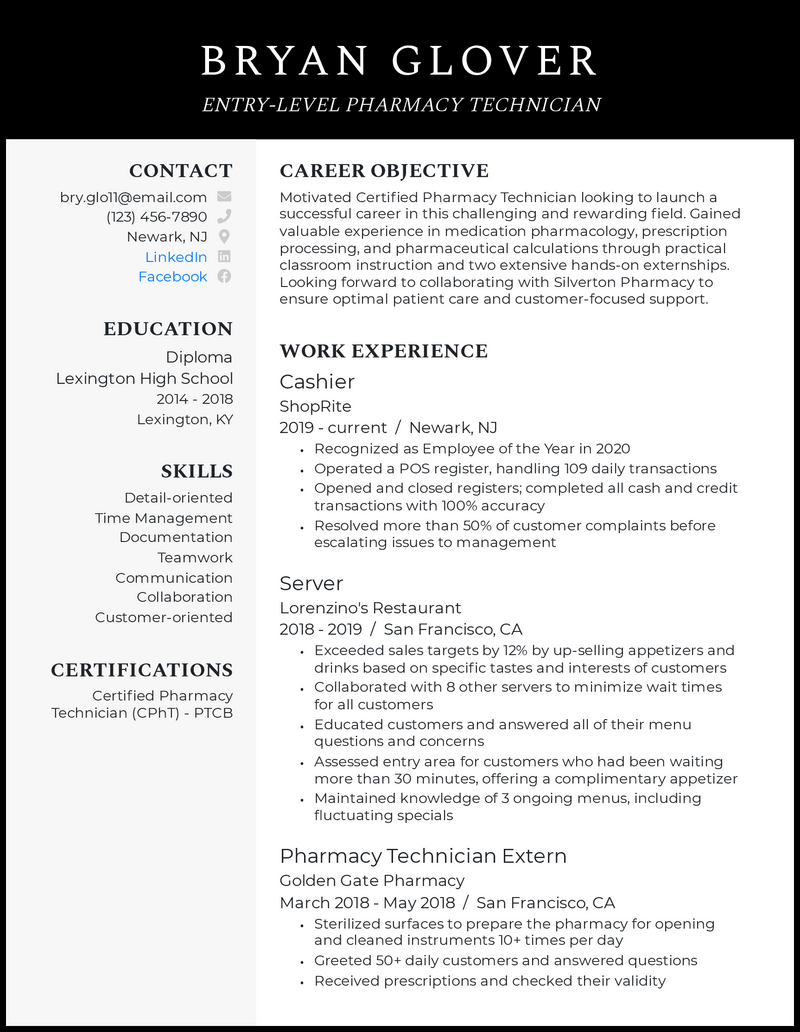
- We suggest using this section to briefly discuss your education, accomplishments, and any internships or externships.
- Use energetic “call to action” statements and tell the hiring manager “why” you want to be a pharmacy technician for their company.
- Even seemingly unrelated roles can be listed on your entry-level pharmacy technician resume if you use them to demonstrate your customer service accomplishments.
- A knack for customer service is one of many resume skills that naturally transfer to a pharm tech career.
Pharmacy Technician No Experience Resume

- Emphasize your excellent customer service, problem-solving skills, and understanding of medication processes in your pharmacy technician no experience resume.
Pharmacy Technician Trainee Resume

- These experiences don’t need to be catered to being a technician either. Mentioning your role as a pharmacy cashier or aide will help the employer know that you’re well-versed with medications and providing accurate consultations. You can also add any relevant skill or tool you’ve got a good hang of in your pharmacy technician trainee resume.
Inpatient Pharmacy Technician Resume

- But you don’t need to stop just here. Upgrade your inpatient pharmacy technician resume by including credible certifications like “Registered Pharmacy Technician” to further prove that you’ve trained under professionals.
CVS Pharmacy Technician Resume
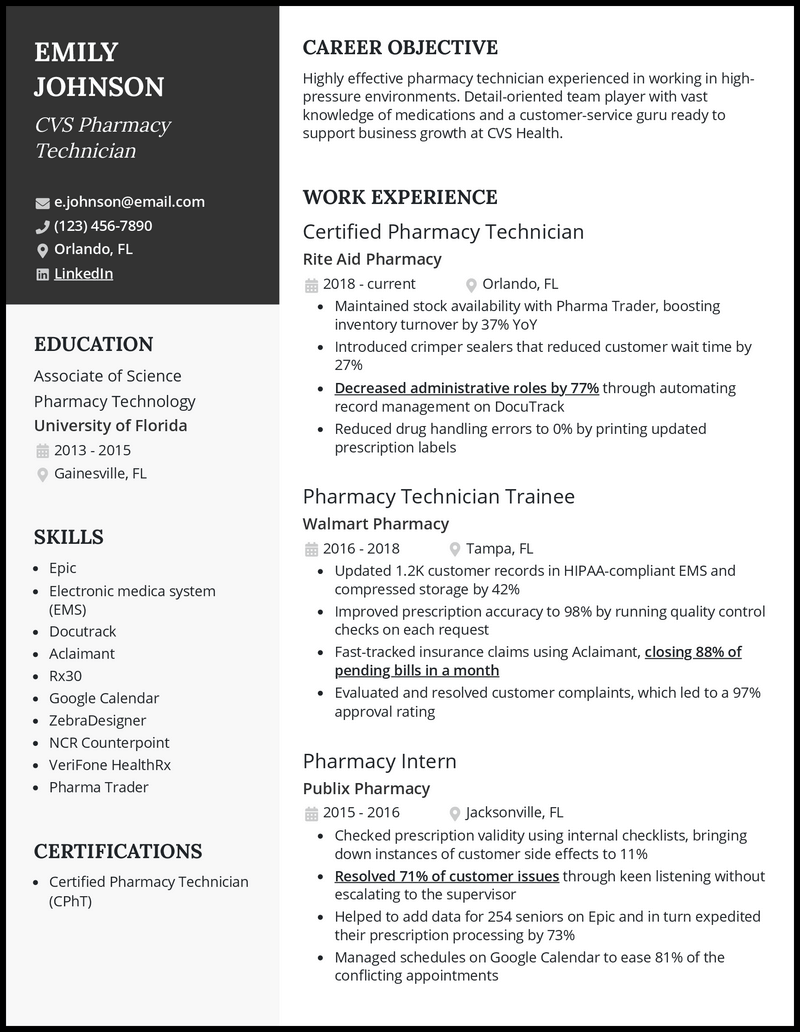
- Drawing employers’ attention to your technical capacity, process improvement, and exceeding goals in your CVS pharmacy technician resume will give you a head start. Fleshing out those details in your pharmacy tech cover letter will get you closer to the finish line!
Registered Pharmacy Technician Resume
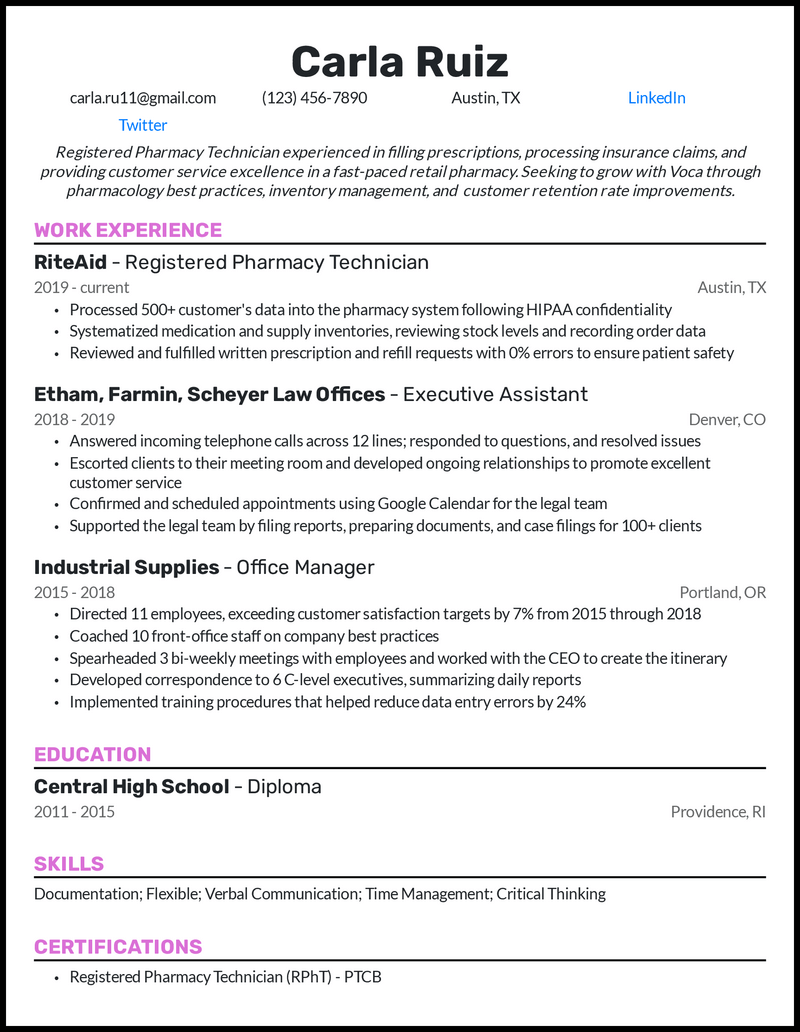
- Double and triple-check your resume for details like grammar and spelling to prove you really are detail-minded and not careless.
- Even seemingly unrelated jobs can showcase your abilities in accuracy, cross-training, organization, customer service, and documentation handling.
- Hiring managers need to know your qualifications, and CPhTs and RPhTs earn more than their unlicensed counterparts.
Long-Term Care Pharmacy Technician Resume
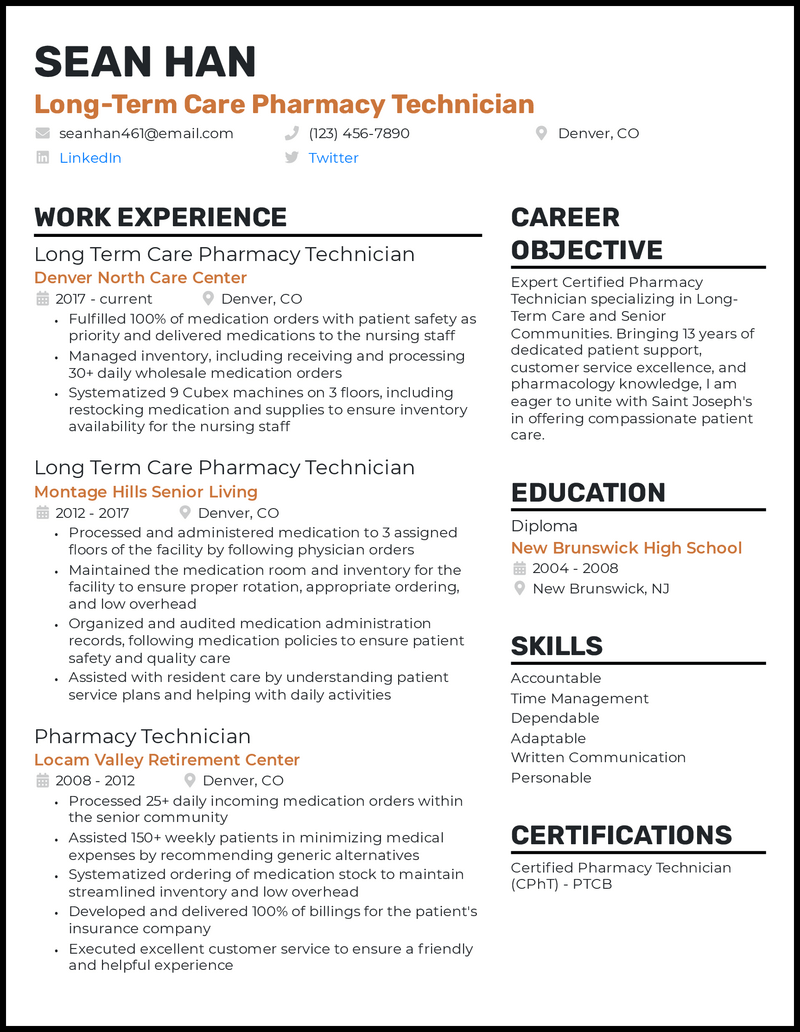
- Prove you’re worth an interview by emphasizing your versatility and impact with metrics.
- For example, use percentages and numbers to show how often you provided patient support outside of the pharmacy, how many patient care plans you managed, and the number of activities you participated in with patients.
- We like the reverse-chronological resume format , as it lists your most recent (and likely relevant) work history first, with older experience following.
- If you’re worried about formatting everything just right, try one of our free Google docs resume templates or Word resume templates for a professional look without all the stress.
Hospital Pharmacy Technician Resume
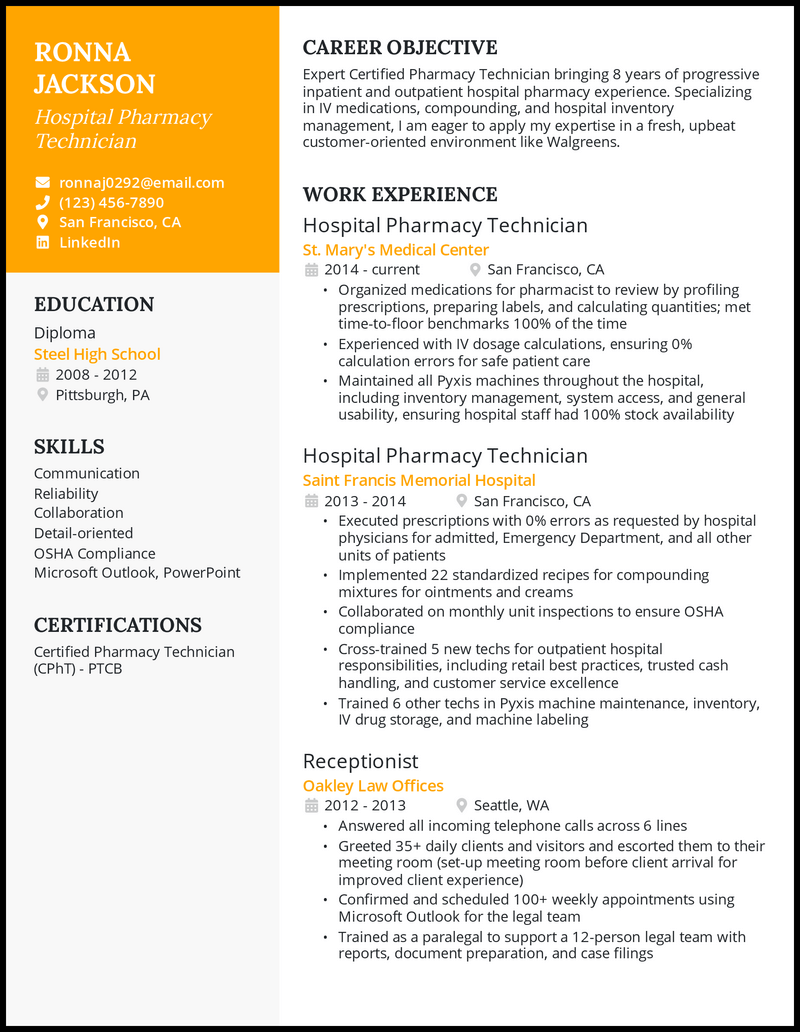
- A worthwhile objective can be tailored to the specific role you’re seeking by sprinkling in relevant keywords from the job description .
- It should also present your very best self in two to three power-packed sentences.
- Don’t forget to mention the target business by name, as this shows the employer that you’ve crafted your resume with their company in mind instead of cranking out mass copies into the cyber abyss!
- We suggest wrapping all your great content in a beautiful resume template with a modest splash of color, but if you’re unsure and need inspiration, we’ve got tons of free resume examples to that effect.
Pharmacy Technician II Resume

- There are two reasons for this. First, it helps Applicant Tracking Systems (ATS) determine if you’re a good fit for the job. Second, it gives hiring managers quick insight into whether you might be a contender. Read the job description extra carefully to determine which of your skills are most suited to the particular job, and emphasize them on your resume. But don’t plagiarize. The person reading your resume likely wrote the job post, and let’s just say that wouldn’t make a good first impression.
- It might not seem like an important section, but it’s almost as valuable as the work experience you list.
- Ensure the skills you list aren’t arbitrary. For example, it wouldn’t be particularly useful for the hiring manager to know that you’re a talented needle felter when they’re really looking for someone who can offer compassionate, patient-centered care.
Certified Pharmacy Technician Resume
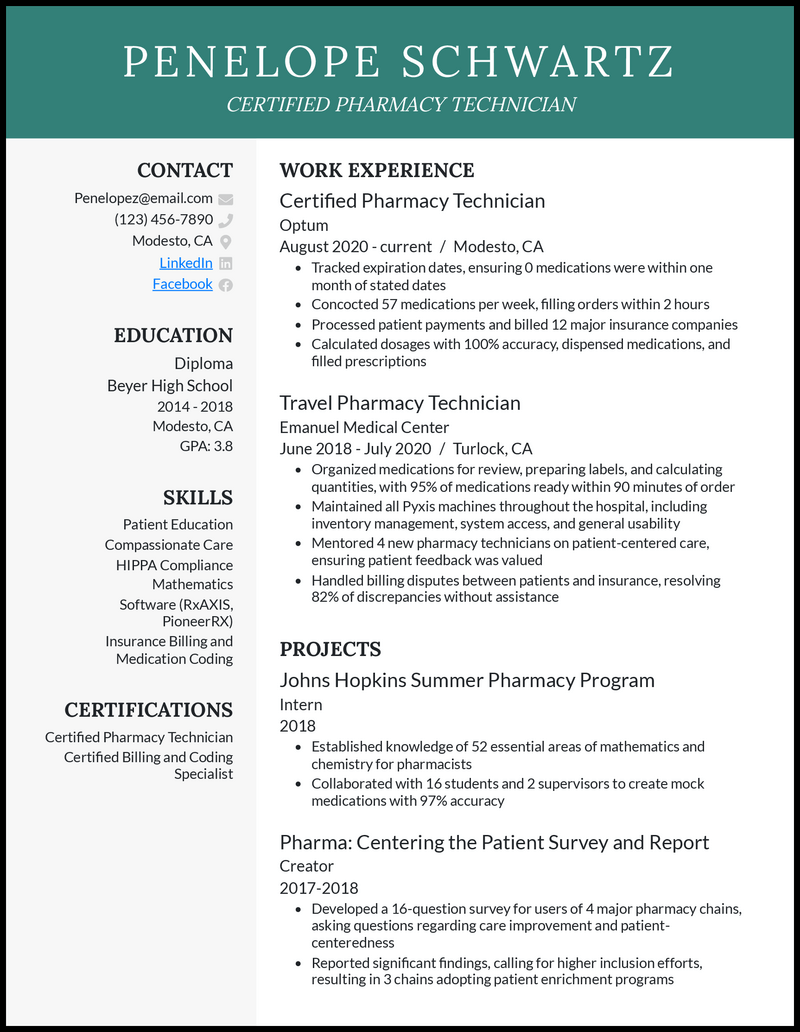
- Try including some relevant projects. These could be many things, really. Are you a chair member of a club? Do you run a YouTube channel? Maybe one of your school projects was relevant?
- No project experience? That’s okay, too! You can even include hobbies and interests on your resume , but just be aware that the hiring manager is likely to ask you about these in an interview. So, if you’re an avid rock collector, be forewarned. It might take more than a second to figure out how rock collecting makes you a better pharmacy tech, so ask yourself these questions now rather than waiting for an interviewer to catch you unprepared.
Related resume guides
- Medical Receptionist
- Medical Assistant
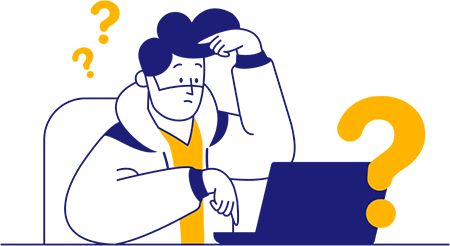
A pharmacy technician handles filling prescriptions and checking the inventory. Techs give medicine to patients, whether over-the-counter or with a prescription. They also accumulate prescriptions and deliver information to patients and other healthcare professionals.
Most pharmacy techs work in the public sector and hospital pharmacies. They can also work in the sales department in the pharmaceutical industry. As a technician, you can also work in prisons, schools, and the military sectors.
When looking for a job, highlight your skills and experience with a well-formatted resume to help employers select you as the best fit. We’ll walk through four tips for your pharmacy tech resume, covering your skills, resume format, job experience impact, and resume customization .
Highlight your pharmacy technician skills
When a company advertises a job vacancy, many applications prevent that company from carefully looking through each one. So, companies use applicant tracking system software that screens through resumes to weed out candidates.
Unfortunately, if you’re a highly-qualified candidate but fail to include the right keywords in your resume, you’ll miss out on the job simply because the robots dumped you in the circular file . You must create a resume so the ATS finds you an ideal candidate for the job. Pass the ATS; then your resume will actually make it to human eyes.
Employers look at resumes and applications before scheduling interviews. Your pharmacy technician resume should highlight your abilities before you meet an employer for your interview. If those capabilities aren’t readily seen throughout your skills section and job experience bullet points, chances of interviewing are slim to none.
The resume skills section is crucial. The ATS is set to screen the skills required for the job. Knowing what you should include in your skills section is a matter of reading through the job description ad to determine what an employer is particularly seeking.
This pharmacy tech job candidate took the time to read through the skills listed in the job description:

You’ll see in the example above that there are both hard and soft skills. As a pharmacy tech, include more hard than soft skills. Hard skills are fundamental to your tech work and are the qualifications needed for your job. On the other hand, soft skills are more general abilities beneficial to do your job well, such as customer service or verbal communication.
While this isn’t an exhaustive list, pharmacies are looking for these sorts of hard skills:
- Insurance coverage
- Compounding
- Narcotic inventories
- Third-party billing
- Coordinating prior authorizations
- Patient confidentiality & HIPAA
- Extensive knowledge of generic and brand-name drugs
- Prescription filling & labeling
Soft skills can be important, especially as pharmacy techs must collaborate with medical teams and the public. Soft skills could include:
- Attention to detail
- Interpersonal communication
- Compassionate & empathetic
- Time management
Format your pharmacy technician resume properly
When writing your resume , ensure your resume has the proper format. A suitable layout highlights the key areas of your resume and attracts the hiring manager to read through your resume. A good resume format presents the essentials upfront to entice the hiring manager.
Use the reverse-chronological format, which helps both the ATS and employers read your resume. Listing your experience in reverse-chronological order keeps the most current, relevant information in the top third of your resume, where the employer’s eyes will be drawn first.
Beyond this, we think you’ll find the following formatting tips helpful when it comes to beating the ATS and attracting the attention of an employer:
- Margins: Aim for half to one-inch margins all around.
- Length: Keep your pharmacy tech resume on an exact page. Less than a page looks like you don’t care, but going over a page looks messy and incomplete.
- Bullet points: Use bullet points in places like your work experience to break the text into easy-to-read chunks.
- Icons/images: Avoid them like the plague. The ATS gets quite befuddled when you use something besides the basic, round bullet point.
- Customization: We’ll talk more about this later, but the point is that your resume shouldn’t be generic or able to be passed off to any employer. Customize your skills, work experience, and career summary or objective (if you include one).
Writing a pharmacy tech resume objective or summary
Before we go further, let’s unpack that resume objective and resume summary issue. Both are short paragraphs of two to three sentences each; while they’re similar, some differences are worth noting.
An objective should be specific about the position and the type of job you want. Its purpose is to identify the career you seek and how you can add value to the company. Consider an objective if transitioning to pharmacy tech work from another field. You might also use an objective if you’re an entry-level worker.
A summary highlights your qualifications for the job based on your combined (10+ years for a summary) experience. It gives the hiring managers a quick synopsis of your history and underscores your strengths and skills. Like the objective, a summary should be tailored to your desired role.
While specific, customized objectives and summaries are effective, this section won’t do you a bit of good if you slap something together willy-nilly. If you lack the time or energy to do it right, skip it.
In the following objective and summary samples, note that the job seeker demonstrates:
- Clear and valuable personal qualities
- Quantitative information
- Top skills and capabilities
- Interest in a specific company and role
Objective Example
Critical and quick-thinking registered pharmacy technician with 4 years of experience in filling prescriptions, processing insurance claims, and providing unparalleled customer service in a fast-paced retail pharmacy. Seeking a position at Shield’s Health where I can grow in the healthcare industry through pharmacology best practices, inventory management improvements, and increasing customer retention rates.
Summary Example
Empathetic and quality-minded certified pharmacy technician specializing in long-term care and senior communities for the past 13 years. Offering expertise in dedicated patient support, customer service excellence, and extensive pharmacology knowledge to provide efficient processes and inventory management while never compromising patient confidentiality or safety. Motivated to lead a team of pharmacy technicians and apprentices at CVS Health.
Give data and stats to show your impact as a pharmacy tech
When checking your resume , it’s crucial to set yourself apart from the competition. As a pharmacy technician, you’re responsible for more than just filling prescriptions. Do your best to show action and achievement when discussing your experience. Remember, it should be relevant and tailored to the specific responsibilities listed in the job description ad.
One of the best ways you can demonstrate your impact at previous jobs is by sharing data and stats. Metrics put weight behind your words. While words are easy enough to dismiss, numbers provide credibility and make employers pay attention. Knowing what you should quantify isn’t always easy, but think about the following:
- Speed and accuracy: Your work as a pharmacy tech requires you to be quick; however, it can be detrimental to you, the company, and your customers if you sacrifice quality. Can you demonstrate your ability to work quickly, effectively, and efficiently through numbers?
- Customer retention: As we said earlier, your job is more than filling prescriptions. Customer service is a large part of what you do, and if customers are dwindling, the company is relying on you to rebuild trust and retain those customers. Perhaps you can showcase your ability to win customers and keep them long-term.
- Output: Depending on the size of the pharmacies you’ve worked for in the past, how much you fulfill in one day will differ. Discussing this with an estimated number of customers assisted per day or orders fulfilled may be relevant to the job you’re applying for.
Can you find the above three quantifiers in the job description bullet points below?
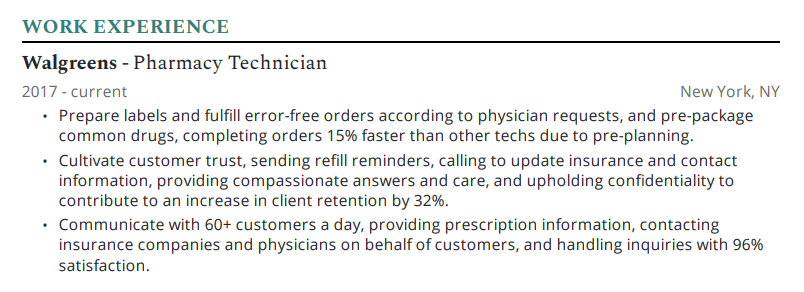
Tailor your resume for each pharmacy tech job
We’ve hinted at this and can’t stress it enough. Every pharmacy has different roles and responsibilities, and the best way to get shortlisted for an interview is to tailor your resume for every job application. Customizing your resume to fit the job description helps prove you’re the right candidate.
Tailoring your resume doesn’t mean having to recreate it every time. Instead, it involves replacing and adding details according to the job’s roles. Career experts recommend adjusting a few sections to suit the job description.
If you include a summary or objective statement , specifically discuss the most important skills and the company itself. Your skills section should also reflect the skills prioritized in the job description. Lastly, if the job ad states that the pharmacy needs someone to manage the inventory or lead a tech team, consider how you might demonstrate similar experience in your work history section .
Let’s explore how to adjust several pharmacy tech resumes to the role you want:
Pharmacy technician resume
- If you do include one, remember the tips we discussed earlier.
- Pay attention to state laws and requirements. List your certification on your resume because this will be a deal breaker for many employers if you forget to include it.
Hospital pharmacy technician resume
- Use your job experience bullet points to discuss medication distribution to the appropriate floors or units, surveillance for drug misuse, and assisting patients with inquiries and problems.
Entry-level pharmacy technician resume
- In your experience section, include past jobs, such as retail, restaurant service, administrative work, childcare, etc.
- If you have no work experience, you can emphasize any education beyond high school and certificates you’ve earned that qualify you to be a pharmacy tech.
- Additionally, you may also include resume-relevant interests, hobbies , and projects.
Long-term care pharmacy technician resume
- Your resume should highlight your knowledge of planning, implementing, and evaluating plans and your ability to communicate and collaborate with the nursing staff.
- You’ll also want to demonstrate that you’re a pro when treating elderly and ill patients with compassion, empathy, and dignity.
Registered pharmacy technician resume
- Your resume must state that you’re a registered pharmacy technician. For a role specifically titled this, include “Registered Pharmacy Technician” in the job title.
- Include a license/certification section in the sidebar or bottom of your resume where you can list your state certification.
- The ATS software weeds out unregistered candidates from the many applications.
Key Points for Your Pharmacy Technician Resume

Taking the initiative to work on your resume is the first step to getting the job. Kudos to you for wanting to perfect your pharmacy technician resume. As a quick recap, here’s what we covered together:
- Skills and the ATS
- Format and the ATS
- Quantifying your impact
- Customizing your resume
All that’s left is for you to start your resume, and when you’re done, run it through our free resume checker , where you’ll get AI-powered pointers to help you put your best foot forward.
Cheers! You’re well on your way to securing your next pharmacy technician job!
Land your next job with our AI-powered, user-friendly tool.
Gut the guesswork in your job hunt. Upload your existing resume to check your score and make improvements. Build a resume with one of our eye-catching, recruiter-friendly templates.
• Work in real-time with immediate feedback and tips from our AI-powered experience. • Leverage thousands of pre-written, job-specific bullet points. • Edit your resume in-line like a Google Doc or let us walk you through each section at a time. • Enjoy peace of mind with our money-back guarantee and 5-star customer support.
Resume Checker Resume Builder

- Pharmacy School
Winning Pharmacy Residency Statement Examples
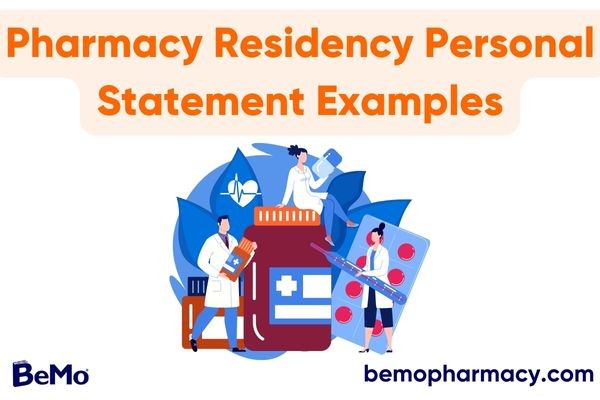
If you’re in pharmacy school and planning you’re future, you know that you don’t need a residency or pharmacy residency personal statement examples to be a licensed pharmacist. That’s one advantage pharmacy school grads have over medical school grads, who need to do a minimum one year of residency before they can take the USMLE Step 3 . But you also know that doing one or two post-graduate years of a pharmacy residency will increase your chances of getting into other sectors of the industry among many more benefits, which we’ll explore later. If you are thinking about doing a pharmacy residency, we have what you need. You will need to submit an online application, but don’t use your old pharmacy school personal statement . We’ll help you write a new one and explain a little about how to apply to pharmacy residency programs in the US and Canada.
>> Want us to help you get accepted? Schedule a free strategy call here . <<
Article Contents 15 min read
Should you pursue a pharmacy residency.
Maybe you have your mind set on going into retail pharmacy; there's nothing wrong with that, but there are some things you should know about the retail pharmacy landscape. Over 60% of the pharmacists practicing in the US work in retail pharmacies as part of giant chains like Walgreens and CVS.
However, as big box stores and other retail chains introduce pharmacies into their stores, small, independent pharmacies, are being pushed out. What’s more, many of these giant retail pharmacies are closing stores. If that weren’t enough, labor statistics predict sluggish job growth in the retail pharmacy sector over the next five years, so there’s that too.
We say all this to encourage you to think about the value of a pharmacy residency, and how applying to any number of the pharmacy residency programs in the US or Canada can give you a head-start on your career. One study noted that a pharmacy residency leads to the development of research, leadership and clinical skills in those who complete the program, far beyond what is taught in pharmacy school.
Want to know how to avoid residency application red flags? Watch this video:
Types of Pharmacy Residencies
If you’re not sure about what type of pharmacy you want to go into, we’ll explain a little about the three main ones in both the US and Canada, which are related to the variety of roles a pharmacist can fill. They include:
- Academic-based residencies (at universities and medical schools)
- Hospital-based residencies
- Industry-based residencies
But one unique aspect of pharmacy residencies is that you can go directly into the private sector and learn within the environment you’ll most likely be working at after you finish, so you don’t have to go learning how to find a job after residency .
You can do these residencies at an accredited pharmacy school or university that confers the entry-level PharmD degree. According to the American Society of Health-System Pharmacists (ASHP), there are close to 2400 different residency programs in the US. In Canada, there are much fewer; only 30 programs in total offered by schools such as the University of Toronto , the University of British Columbia , Dalhousie University, and Laval University.
Academic-based residency programs are good places to do residencies because you have a variety of specializations, a diverse teaching curriculum, and a lot of research opportunities. So, even though we repeat it a lot, you need to research each program carefully to find one that matches your research interests and career goals. For example, the University of Toronto has two programs:
- Hospital Pharmacy Residency
- Industrial Pharmacy Residency
Hospital-Based Pharmacy Residency
A hospital-based pharmacy residency does for you what a family medicine residency and an internal medicine residency does for medical students: it puts you in the middle of a clinical environment where you have direct patient experience, the opportunity to train with exemplary faculty mentors, and the chance to be a part of or lead a healthcare team. This is the best choice for you, if you see yourself staying in healthcare, whether it be a hospital, clinic or some other medical environment.
Of course, every hospital-based residency will offer you different opportunities and clinical settings. The teaching curriculum can have a specific focus or have unique electives that you can choose based on your own goals and interests, which is why it bears repeating that you need to examine what each program offers to make sure it's right for you.
Industrial-Based Pharmacy Residency
This type of pharmacy residency is a good option if you are interested in research and being part of the development of new treatments and medications. But it involves so much more. An industry-based pharmacy residency gives you the chance to learn marketable skills that are specific to the global pharmaceutical industry, such as learning about international pharmaceutical markets, national regulatory frameworks and how to create new drugs according to these frameworks.
If you’ve made the decision to do a pharmacy residency (good choice, by the way), this will be a short run-down of how to apply, even though you may be familiar with the process.
Here is where the paths of pharmacy grads and med school grads converge, as students from pharmacy schools in the US and pharmacy schools in Canada must apply to pharmacy residency programs through centralized residency match services; the Pharmacy Online Residency Centralized Application Service ( PhORCAS ) in the US; the Pharmacy Residency Application and Matching Service ( PRAMS ) in Canada. However, you do not need PARMS to apply directly to academic-based programs; you can apply to directly to the school. PARMS is for hospital-based residencies.
These programs work much in the same way as other residency match services , such as ERAS and the NRMP in the US; and CaRMS in Canada. You gather your specific application materials for each service, choose your programs (academic, hospital, or industry) and send your application. You will be notified of your candidacy status by the institution you applied to and run the same gamut as a med school grad would to enter a residency: application, interview(s) (if you qualify), decision.
Here are some of the general pharmacy residency requirements for each country:
Canadian Pharmacy Residency Requirements
- Be registered with the Canadian Pharmacy Residency Board (CPRB)
- Have graduated from a pharmacy school program accredited by the Canadian Council for the Accreditation of Pharmacy Programs (CCAPP)
- Be a Canadian citizen or have legal permission to work and live in Canada
- Have a licence to practice pharmacy or be in the process of obtaining their licence with the PEBC Qualifying Examination – Part I Multiple-Choice Questions (MCQ) and Part II Objective Structured Clinical Examination (OSCE)
These are the base requirements, but each program, depending on the type of residency you want to enter, may have additional ones that applicants must meet, which can vary from:
- Being registered with the Canadian Society of Hospital Pharmacists
- Being a registered student with the university or institution offering the residency
- Never being expelled from any other Canadian residency program
US Pharmacy Residency Requirements
The residency system for graduates from pharmacy schools in the US has both general and program-specific requirements. The PhORCAS application service, which is administered by the American Society of Health-System Pharmacists (ASHP) functions similar to other residency match services in the US and organizes all residency applications to match them to the various residency programs offered throughout the country.
General Requirements
- Currently holding or in the process of receiving a licence (where, depends on program)
- Graduated from an ACPE-accredited pharmacy school
- Hold a PharmD degree
- Be a US citizen or have permanent resident status
To apply for a pharmacy residency through PhORCAS, you must submit the following:
- Personal information
- Academic history (pharmacy and undergraduate schools)
- Extracurriculars
- Residency CV
- Residency personal statement or residency letter of intent
- Rank order list
- Letters of recommendation
These are the main components of the PhORCAS application, but different residency programs will have their own requirements, so students need to ensure they meet all their programs requirements and submit any supplemental materials either through PhORCAS or to the program directly.
You will only need a pharmacy residency personal statement if you are applying to an academic or hospital-based residency. The industry-based residencies usually only ask you for a research proposal or letter of intent - some academic programs ask for a letter of intent as well - so we’ll show you examples of what to include in your personal statement for academic and hospital-based residencies.
You’ve probably written one or two personal statements in the past, and, as we hear from many of our students, it is not easy. While it may seem like a no-brainer to you on why you want to enter a residency, the goal is to articulate and communicate that desire in 600 words or less (PARMS personal statements must not exceed 600 words) in a professional and well-written statement.
Fortunately, both PhORCAS and PARMS offer you advice and guidelines about what to write, but here we’ll do something a little different. We’ll use the same strategies we used with BeMo students who applied to pharmacy residencies (and got in!) and break-down how to construct your own personal statement with your own experiences, words, and goals.
PhORCAS and PARMS suggest the following, which is good advice, but you need something more personalized and specific, which is what we’ll do with the proceeding pharmacy residency personal statement examples.
- What are you looking for most in a residency program?
- Why should we choose you?
- What are you goals and research interests?
- What do you hope to gain from our residency program?
These are the questions you have to answer, but how do you write it in a way that conveys your enthusiasm, knowledge, and writing skills? Keep reading to learn how to infuse paragraph with style and verve so you get into the residency of your choice.
Writing your Pharmacy Residency Personal Statement
All good personal statements tell a story. But great ones reveal a complex, multi-faceted, constantly evolving human being behind them who has experienced challenges in life, overcome them and has the potential to do great things.
However, a pharmacy residency personal statement has to show a little more. Depending on the type of pharmacist you want to be (industry or healthcare-based), you may have to adjust your statement to reflect the unique skill sets you have to excel in that particular industry sector.
If you are applying to an industry residency, you won’t have a lot of direct patient experience or any clinical rotations, so it makes no sense to talk about how you want to interact with patients. Instead, it is mostly your research capabilities, experiences in the lab, and project goals that will make you an attractive applicant to an industry-based residency.
If you are applying for a hospital-based residency, here is where you would highlight previous direct patient experiences, shadowing, cross-collaboration with various teams, and your past makes more sense to talk about here.
This is why we constantly tell our students to, “show, don’t tell”, as a simple reminder to let them know that showing what you did during the time leading up to a pharmacy residency (or whatever professional goal you are trying to achieve) and how you developed into the resilient, dedicated and passionate individual that you are matters more than reciting your resume or academic achievements.
Take these two opening paragraphs for a pharmacy residency personal statement:
Pharmacy Residency Personal Statement Example Opening #1
I am excited to apply for the Pharmacy Residency Program as it represents an invaluable opportunity for my professional development and growth. I am eager to further enhance my clinical skills, expand my knowledge base, and contribute to the field of pharmacy. Pharmacy residency programs provide a unique learning experience that goes beyond what is obtained during pharmacy school. The chance to work closely with experienced preceptors, engage in interdisciplinary collaborations, and rotate through various clinical settings is unparalleled.
Pharmacy Residency Personal Statement Example Opening #2
I can think of no greater fear-inducing event than struggling to breathe. I woke up like that one morning. I had the symptoms of a cold – coughing, sore throat, congestion – and my doctor had prescribed antibiotics. But the day after I started them, I woke up breathless. Fortunately, I was not alone. My partner called an ambulance, because I couldn’t speak. The paramedics came and gave me oxygen. With each complete breath, I calmed down. I was so soothed by the oxygen that I started to cry from how good it felt to breathe again.
Now, can you tell the differences between the two?
The first sample conveys no humanity and feels like the rote, lifeless copy written in a brochure. It gives no detail and says nothing important or new. But the second example grabs our attention right away by relating to us through a universal fear (not being able to breathe) and setting us up to find out what happens next.
The above samples are both fictional, but then the challenge becomes, what is something unique to you and your experience that you can talk about? Remember, it’s a “personal” statement, so don’t be afraid to talk about setbacks, failures, tragedies but always with an eye toward how that experience has prepared you for now.
To do this with a full example, we’ll first create an applicant profile. In this profile, we’ll give a short autobiographical sketch of the applicant, and then use that information in the provided pharmacy residency personal statement example. We’ll also address the statement to a real pharmacy residency program in either the US or Canada. When you read the statement, you’ll see bold text that explains how the information from the profile is being used, so you get an idea of how to do it on your own.
Every time I’ve seen someone brought back to life by Narcan, I think about the one life it did not save. Here you are not only relating the experience, but relating how it affected you. Remember to keep that cause-and-effect formula throughout your writing. You also want to build some mystery and reveal only a few details, but be selective. The more you withhold, the more your reader will want to continue. I first heard of naloxone in an intro to biochemistry class. My professor explained the chemistry of the drug, but also added a tragic aside: the drug’s creator, Dr. Jack Fishman, lost his step-son, Jonathan to an overdose, even though Narcan existed at the time, only, it was not readily available. You can usually wait until the second or third paragraph to mention something academic, but CAMH has a 300-word limit for its personal essay, so we are making an exception. But, again, remember that anything academic or professional you mention has to relate back to something personal, some change in you.
Hearing that was sobering. My professor said a story like that should motivate us to create drugs that would save lives, but to remember not to always expect miracles, even with a miracle drug like Narcan. I took that as a challenge to learn all I could about addiction, drug policy, harm reduction, the neuroscience behind chemical dependencies and the prevalence of co-occurring disorders, where addiction and mental illness meet. This is where you make the connection to your experience, and mention how learning this knowledge (whatever it may be) put you on the path that you are on now and what you did to show your commitment.
I did a six-month internship at the Ontario Harn Reduction Network and got the opportunity to meet and learn from Drug Culture Consultants who had lived with substance use problems. Hearing about all the obstacles they faced to getting Narcan or other treatment options made me realize that pharmaceutical companies and regulatory agencies alone should not be the ones deciding drug policy. They should collaborate with public health authorities and other non-profits who work directly with affected population groups who would benefit most. This section is another “stepping stone” to something you want to say about your goals and desires and what motivates you, but also demonstrates you have an informed opinion about an important issue. That’s what interests me about the CAMH; the advocacy on behalf of people with substance use and mental health disorders and all the research done here on their behalf. Here, at the end, is where you can connect your mission to the program’s and make your case for why you are a good fit for the program.
CAMH hosts one of the most revered pharmacogenetics research centers in Canada, which is an area of pharmacology I would like to explore further, as it holds promise to create new drugs to treat substance use and mental health disorders with medication made specifically for them . Given the opportunity, I am confident that I will be able to make a meaningful impact and contribute to CAMH's mission of transforming lives through leading-edge research, comprehensive care, and innovative treatments.
Applicant Profile #2
Name: Grace Chao
Education: Touro College of Pharmacy, PharmD
Grace was first interested in the tech sector, and majored in computer science. But she added biology as a minor in her second year because of the recommendation of a professor and has been interested in the intersection of medicine and information technology ever since. She went to pharmacy school in order to learn more about the medication that she, as someone with ADHD, takes on a regular basis and whether information technology can improve medication delivery systems in major hospitals.
Residency Program: Mount Sinai Brooklyn
Pharmacy Residency Personal Statement Example #2
I was only fourteen when I was diagnosed with attention-deficit/hyperactivity disorder (ADHD) and it made me scared. Here you are being vulnerable and open about a personal issue, which is exactly the kind of thing personal statements are for; don’t be afraid to open up and mention an obstacle, setback or challenge, so long as you talk about its effects on you (cause-effect). I didn’t know what it was and my doctor’s explanations were confusing. It made me scared because I loved school and I was afraid that I might not be able to keep going to school the way I was used to. My doctor prescribed medication and it was when our pharmacist, Mr. Chee, talked to me about my ADHD that I finally felt better.
Mr. Chee took the time to explain the effects of the prescribed medication and patiently discussed the potential side effects, along with strategies to mitigate them. This compassionate approach is something that I never forgot and it proved pivotal later on in my career, when I was deciding what to do after I graduated. The “inciting incident” can come in any time in your narrative, but the way you talk about it can vary. You can be explicit and say “this person made me decide to be a pharmacist” or in a more implied way, like here.
There are various requirements for each program, as is standard for residency applications. The PhORCAS system in the US is similar to the AMCAS medical school application service, in that it sets the word limit to 600 words. In Canada, as evidenced by the Center for Addiction and Mental Health, each program has its own letter and length requirements.
It depends on the program. Some may ask for a personal statement, while others ask for a statement of interest more focused on your research history and goals within the residency.
There are dozens of different residencies for pharmacy school graduates that are reflective of all the versatility of the pharmacy profession. In the US, there are many more opportunities, given there are so many pharmacy schools in the US, so applicants can apply to a community clinic residency, outpatient or drug rehabilitation center residency, or a traditional hospital-based residency, to name a few.
It depends on your interests and where you see yourself in ten years. Do you want to create new medications? Do you want to continue researching? Do you want to go practice at a public hospital? Do you want to enter your own private practice? These are the questions you have to answer to choose which residency is best for you.
Again, each program has its own requirements, but they typically ask you to explain why you want to enter this program, and this specific residency. Talk about your experiences in pharmacy school and how they helped influence your decision to pursue a residency, as it is an optional move and not required to receive a pharmacy license.
Do not write your entire life story or dwell too long on certain experiences. Keep the narrative moving forward and do not use unprofessional language or talk negatively of others, including other healthcare professions.
There is objective best when it comes to a pharmacy, or any specialty, residency program. The “best” program for you is one that coincides with your research interests, professional goals, and educational background.
No. AI cannot write in detail about your experiences, your emotions, and what you’ve done to prepare yourself for this residency. An AI-generated personal statement is easy to spot because it will generate a generic, incoherent repetitive mess that will surely get you rejected before the rest of your application is viewed.
Want more free tips? Subscribe to our channels for more free and useful content!
Apple Podcasts
Like our blog? Write for us ! >>
Have a question ask our admissions experts below and we'll answer your questions, get started now.
Talk to one of our admissions experts
Our site uses cookies. By using our website, you agree with our cookie policy .
FREE Training Webinar:
How to make your residency application stand out, (and avoid the top 5 reasons most applicants don't match their top choice program).
- Schools by State
- Best Schools
Home » Articles » Sample Pharmacy Technician Cover Letters
- Sample Pharmacy Technician Cover Letters
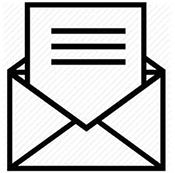
How To Write
The pharmacy tech cover letter must be succinct and to the point, with an affable and professional tone maintained throughout. A large section of your future job will encompass communicating with patients; hence you must ensure that you communicate in a clear, straightforward way. Evaluate every sentence that you use, asking yourself whether it is efficient. Your letter should be made convincing and engaging by using active verbs such as prepared, adapted, processed, operated, helped, verified, and highlighted.
Draft the letter as per the requirements of the employer in order to seize his interest and convince him to read your resume and employ you.
Cover Letter Guidelines
1. lucidity of language:, 2. mistake free:, 3. concise and up-to-date:, entry level pharmacy technician cover letter samples.
This letter is for Susan Harrison who has just obtained her PTCB certification. She does not have any prior work experience and neither has she completed any formal training. She is applying for an entry level position at a family owned pharmacy.
Susan Harrison High Street, San Francisco, CA 91010 Cell: (555)987-1111 [email protected]
Dear Mr Albert,
I would like to apply for an entry level pharmacy technician job at Alberts Pharmacy. I have recently obtained my PTCB certification and am looking forward to starting my career at a family owned pharmacy.
I truly believe a pharmacy technician can be successful with a strong desire to help others along with necessary skills and knowledge. Being a family owned pharmacy, I look forward to helping patients with their prescription needs.
Although I havent really worked before, I have had an opportunity to do an externship at CVS where I gained hands-on knowledge about Pharmacy Technology. I have excellent communication skills, an eye for detail and have the knowledge of pharmacy operations.
I can assure you that I will be a valuable addition in Alberts Pharmacy as I am a responsible and eager learner, who will quickly pickup all the nuances of your pharmacy. I would be greatly obliged if you call me for an interview, where I can personally discuss my skills and capabilities in detail.
Susan Harrison
This cover letter is written for Diana Adams who has just completed her Diploma and obtained her PTCB certification. She has no prior experience.
Dear Ms. Lisa,
When I leant about a pharmacy technician opening, I was keen to join your team in CVS Pharmacy. I have just recently graduated from an ASHP pharmacy technician program at Angelina College and thereafter obtained my PTCB certification. With all the knowledge and skills, that I have gained, I am strongly prepared to contribute to your goals and objectives as a pharmacy technician.
With my Diploma in Pharmacy Technology, I am well-versed with various aspects of pharmacy operations including, preparation of prescription orders, processing insurance claims, printing labels, entering patient data, managing inventory and measuring and mixing of drugs. With an internship which gave me real-time experience I am well equipped with knowledge to take on the role of a pharmacy technician in CVS Pharmacy. I also excel in organizational and communication skills, which are imperative to being a pharmacy technician.
My enclosed resume highlights my accomplishments to date, some of which include:
Achieving a Diploma in Pharmacy Technology from Angelina College after completing a rigorous hands-on internship.
An established ability to process prescription orders while complying to pharmacy regulations and facilitating day to-day pharmacy operations under minimum supervision.
Demonstrate strong leadership qualities, accuracy and an eye for detail. Possess a strong sense of commitment with utmost professionalism.
I am confident that my skills, required to be successful as a pharmacy technician have been honed through my educational tenure and I can be an asset to your pharmacy team as your next Pharmacy technician trainee.
Thank you for your consideration; I look forward to hearing from you soon.
Diana Adams.
Leticia Morris is applying to Healthwealth Hospital for the post of a pharmacy technician. She has completed her Associate Degree in Pharmacy Technology and has recently obtained her PTCB certification.
Leticia Morris High Street, San Francisco, CA 91010 Cell: (555)987-1111 [email protected]
Dear Ms. Janet,
I am glad to apply for the position of a pharmacy technician to join your team a Healthwealth Hospital. I am confident I will be able to contribute to the growth of the pharmacy with the extensive knowledge and skills I have gained with my pharmacy technician education. I have recently completed my Associate Degree in Pharmacy Technology from Oconee Fall Line Technical College and passed the PTCB exam thereafter.
I strongly feel that I will be a valuable addition to your team as I am greatly skilled in:
Preparing and processing prescriptions
Counting, labeling and packaging of medicines
Entering correct patient information using computer software
Preparing medications for patients
Compounding intravenous solutions
Managing inventory and stock supplies
Processing insurance claims
Furthermore, my excellent communication skills in English, Spanish and Mandarin will help me communicate with patients of different backgrounds. In addition, I have sound knowledge of preparing IV mixtures and operating automated systems that are used as a base for hospital pharmacy practices. I have enclosed my resume, providing you with details of my education, qualification and skills.
I look forward to meeting you in person to discuss further about my knowledge, capabilities and skills. Also, feel free to me at (001) 221-0023 for any further clarifications. I will call your office after 7 days for a follow-up.
Thank you for your time and consideration.
Leticia Morris,
Enc. Resume
Experienced Pharmacy Technician Cover Letter Samples
This letter is for Sheila Paul who is a certified pharmacy technician and has completed her Pharmacy Technician Diploma from Foothill College. She is currently working at the CVS Pharmacy, as a pharmacy technician since the past two years.
Re: Pharmacy Technician Openings
Dear Mr John,
I am applying for the Pharmacy Technician position at Walgreens, hoping to be a valuable addition to your team of pharmacy technicians. I have recently attained CPHT certification and this makes me a good candidate. Recently, I have got my certification and have already gained two years of work experience at CVS Pharmacy.
I am a suitable applicant for this post, given that I am highly skilled and well-informed in:
Maintaining inventories and keeping the pharmacy organized
Packaging and labelling units for inspection
Performing dispensing of medication with accuracy
Helping with insurance claims
My enclosed resume highlights my educational qualifications and accomplishments, some of which are:
Diploma in pharmacy training from Foothill College
PTCB certification.
Can facilitate everyday pharmacy functions - patient communication and order processing.
Ability to follow oral and written instructions, comprehending directions and new information very swiftly and working under minimum supervision.
Discipline and strong work ethic with an honest professional attitude.
What's more, my brilliant communication skills in English and Spanish help me communicate with clients with ease. I also have sound knowledge of operating automated systems that are used in pharmacies. Kindly find my resume that provides complete details of my education, qualifications and work experience.
I look forward to meeting with you, Mr. John, and am readily available for an interview. I shall call your office after 7 days to follow-up. If you need any further information in the meantime, you may contact me at (555) 111-5555. In case you need any further information, you can call me at (555) 111-5454
Sheila Paul, CPhT
- Best Pharmacy Technician Schools in the Nation - 2024
- Top Online Pharmacy Technician Training Programs - 2024
- Best Doctor of Pharmacy Programs in the Nation - 2024
- 2024 in-depth Pharmacy Technician Salary information
- 2024 Pharmacist Salary details
- 10 Common Mistakes Pharmacy Technicians Commit on the Job and How To Avoid
- 50 Cities Where Pharmacy Technicians Earn The Highest Salary
- Comparing Being A Pharmacy Technician With Other Similar Healthcare Careers
- Deciding Between Online And On Campus Education
- Pharmacy Technician Frequently Asked Questions Answered
- How to Become a Pharmacy Technician - 3 Options
- 46 Interesting Pharmacy Technician Facts
- List of Pharmacy Technician Interview Questions and How to Answer
- Pharmacy Technician Advantages And Disadvantages
- Pharmacy Technician Certification Exam
- 11 Typical Pharmacy Technician Duties
- Sample Pharmacy Technician Resumes
- Factors To Consider While Selecting The Right Pharmacy Technician School
- Why Should You Attend a Pharmacy Technician School & Get Certified?
- 18 Pharmacy Technician Skills to be Successful
- Requirements to Work as a Pharmacy Technician in Your State
- Ten Reasons Why A Pharmacy Technician Should Get Certified
- Types Of Programs Available To Become A Pharmacy Technician
- Typical Work Day Of A Pharmacy Technician At The Top 5 Retail Pharmacies
- Working In Retail Pharmacy VS Hospital Pharmacy

IMAGES
VIDEO
COMMENTS
Updated: Jan 01, 2024. Pharmacy school personal statement examples demonstrate that pharmacy school applications require many different documents to adequately assess you as a potential candidate. In addition to looking at your CV, transcripts, letters of recommendation, and any other required materials, most pharmacy programs ask you to submit ...
Pharmacology Personal Statement Example 1. I am of Haitian descent and my country is one known for its harsh living conditions. There is a constant struggle for survival and poverty is an endemic burden. Despite numerous advances in technology, Haiti has remained the least-developed country in the Western Hemisphere...
As part of your brainstorming, look at successful personal statements. Websites like Studential and ApplyToUni can give you a good idea of what spelled success for past applicants. Or, if you know anyone who went to pharmacy school already, you can ask them for their best tips. 2. Outline and Draft.
Here are some practical tips to keep in mind when writing your pharmacy school personal statement: Start early: Give yourself plenty of time to write a strong personal statement. This isn't something that can be rushed, so start thinking about it well before the application deadline. Be specific: Don't just say that you want to become a ...
The goal of your personal statement is to showcase why you would be the ideal pharmacy student and why your traits/qualities reflect those of a pharmacist. Be as authentic as possible when detailing why you want to be part of the PharmD program. GPA and PCAT scores can only get you so far. Your personal statement is a chance for you to stand ...
6. Pharmacy Technician: Pharmacy technicians assist pharmacists in preparing and dispensing medications. 7. Compounding Pharmacist: Compounding pharmacists specialize in preparing customized medications for individual patients. 8.
Pharmacy personal statements. Discover personal statement examples written by students accepted onto and related courses. Read through the examples to help shape your own personal statement. All Statements Search Pharmacy Courses.
This personal statement was written by crystal1807 for application in 2010. crystal1807's Comments. I have vast experience as a pharmacy technician and strove to show that without sounding "better than" students with no working background. I feel I do not need to talk about what I learned in chemistry though, because they already know.
Highlight your previous achievements. You can use the concluding paragraph to emphasize your accomplishments in your professional or academic career. This can help the reader remember what makes you a good candidate for the position or admission into the pharmacy program. Summarize your personal statement.
246 courses. Visit Website. Browse our range of Pharmacy personal statement examples. Gain inspiration & make sure you're on the right track when writing your own personal statement.
Pharmacy Personal Statement Prompts. Prompt 1: Tell us about yourself (Kings University London) Many universities use a very vague prompt that just instructs you to talk about yourself. As Kingston University London puts it, "You are the main topic of this essay.". This is a great, easy prompt to get.
Pharmacology will give you a range of career options. Gain a highly sought-after qualification by studying Pharmacology and benefit from the state-of-the-art STEM labs at Bedfordshire. Visit Website. Example 7 - Inspire your Pharmacy personal statement with our UCAS examples and learn from previous students who have already applied to university.
Certified by a pharmacy technical training program. To provide support for formulary management and assist customer service with drug-related queries in the role of Pharmacy Technician at PebbleMed, bringing 10 years' experience, CPhT, and effective communication, time management, and organizational skills.
Use your statement to reflect on: your perceptions of what the profession is about, and where you can see yourself within it. the skills and qualities that will be required, both to study pharmacy and to practice it as a profession. evidence of situations or activities where you've displayed some of these skills and qualities yourself.
This personal statement is unrated. Pharmacy has the ability to change people's lives. Whether it is at the level of the community pharmacist offering the best advice possible to common illnesses, to high-level research into drugs that could cure a range of chronic or life-threatening diseases, the role of the pharmacist cannot be overestimated.
Pharmacy School Personal Statement (Details Changed) There was an excruciating throbbing pain, in my head. I found myself fatigued, sweating, and nauseous. The slightest bit of light would exacerbate the pain in my eyes. Sounds were amplified more than normal. Combined with everything else, it was unbearable.
We analyzed countless resumes from all stages of pharmacy technician careers and learned what works to help you get more interviews in 2024. We created 11 pharmacy technician resume samples to help professionals like you build eye-catching resumes. The hardest part of resume writing is getting started.
One of the most important sections of your pharmacy technician CV is your personal statement. Also known as a personal summary, this is a short paragraph that sits at the top of your application. It needs to outline your current role, professional background, and key skills - all in just 2-3 lines. The idea of your personal statement is to ...
How to write a pharmacy technician cover letter. Here are the steps you can take to write a pharmacy technician cover letter: 1. Format the letter. It's important to format your cover letter correctly to show employers your professionalism. Use a standard business letter format for your cover letter. Choose a readable font, such as Times New ...
Pharmacy Residency Personal Statement Example Opening #2. I can think of no greater fear-inducing event than struggling to breathe. I woke up like that one morning. I had the symptoms of a cold - coughing, sore throat, congestion - and my doctor had prescribed antibiotics. But the day after I started them, I woke up breathless.
Follow these steps to writing a personal statement when applying for a role as a pharmacist: 1. Carefully read the employer's instructions. Ensure you carefully read the job application instructions and become familiar with them. They typically note what to include in your application, CV and personal statement.
Your pharmacy technician cover letter should usually have five sections in this order: 1. Heading. At the top of the page, include: Your name and contact information. The date. The recipient's name, title, organization, and contact information (when available) (Note: Feel free to omit this section if you send your letter by email and your ...
Susan Harrison. High Street, San Francisco, CA 91010. Cell: (555)987-1111. [email protected]. Dear Mr Albert, I would like to apply for an entry level pharmacy technician job at Albert s Pharmacy. I have recently obtained my PTCB certification and am looking forward to starting my career at a family owned pharmacy.